#parte 1 de 8!!
Explore tagged Tumblr posts
Text
Perna de Pau
20 momentos durante 20 anos, ou uma tentativa de explorar este personagem enquanto preso no purgatório
a dor não fala a língua da gentileza, mas é fluente em seus gritos
AVISO: O texto a seguir apresenta algumas descri��ões gráficas e possivelmente perturbadoras
0: O Halloween não é uma festa comumente comemorada no Brasil, e uma cidade pequena e isolada como Sococó da Ema não deveria dar tanta importância para celebrações estrangeiras. No entanto, cidades do interior tem suas peculiaridades, e a de Sococó da Ema é seu fascínio pelo macabro — as festas de Halloween são maiores e mais esperadas que as do Natal. Não que isso te incomode, é claro. Como habitante nativo de Sococó da Ema, você gosta do oculto e sombrio tanto quanto gosta dos doces da Jumenta Voadora (e porque uma mulher tão simpática teria um nome que soa tão mal vai além da sua capacidade de compreensão). Por isso, neste ano, sua fantasia é o produto final de mais de um mês de trabalho: um boneco voodoo em tamanho infantil. Sua mãe ajudou na confecção, mas você tem orgulho de poder dizer que fez quase tudo sozinho. Se soubesse dos eventos que iriam transparecer, você não sentiria nenhuma emoção positiva; Uma hora você e seus amigos estão andando pela floresta, animados com as festividades, e no momento seguinte há uma criança trajando um crânio de jumento correndo na sua direção. Há gritos de susto, e então de dor quando alguém tropeça e abre o joelho em uma pedra, e então… E então do mais puro pavor, quando o branco do osso vai desaparecendo penhasco abaixo, em direção ao rio que seus pais sempre lhe avisaram que era perigoso demais para nadar. Você tem pesadelos com esses gritos por semanas, até, é claro que você se torna o pesadelo: você agora é um filho de Umbra, e seu nome é Perna de Pau.
1: A pior parte de se estar morto (ou, como Dona Morte explicou, em estado de suspensão no eterno purgatório), é que você é incapaz de sentir. Não sentimentos, porque a entidade que os colocou ali provavelmente se deleita com seu sofrimento, mas sim qualquer coisa física. Sejam abraços ou empurrões, a queimação de ter água em seus pulmões ou do sagrado sal, você não sente nada. Nada além da culpa, é claro, porque cada toque nocivo que você tentou infligir em si mesmo em uma busca desesperada por conexão, foi redirecionado e ampliado para os seus amigos. Dói, ver eles sofrendo, mas não tanto quanto dói a falta do seu sofrimento.
2: A cidade renomeou a festa. Agora, ao invés de Halloween, é o Dia da Jumenta Voadora. Há uma certa ironia nisso, no fato que é a homenageada que causou e ainda irá causar tanta destruição, mas você não possui o gosto por drama de Absinto ou a facilidade com metáforas de Bailarina, então não comenta nada.
3: As buscas por você e seus amigos finalmente cessaram, as autoridades perdendo a esperança de lhes acharem com vida ou até mesmo sem. Há muitos lugares para crianças se perderem na floresta, e vocês são uma mera nota de rodapé na festança daquele ano.
4: Constroem um memorial, algo simbólico, algo bonito, algo que cimenta ainda mais a marca da Serpente. Você não consegue sentir que está chorando quando vê seus pais levarem flores para o túmulo vazio, e tampouco consegue sentir o toque de Absinto em seu ombro na tentativa de confortá-lo. Ao invés disso, Sangria fica passando as mãos nas bochechas secas e Violinista inclina a cabeça na direção do toque fantasma.
5: Você costumava odiar sentir dor, o tipo de criança que esperneava pelo medo de tomar uma picada de agulha no posto de saúde.
6: Assim como todos os outros, você está aprendendo a controlar seus poderes. Quando Absinto acidentalmente ateia fogo em você, os gritos de dor de Viúva duram meros minutos antes da sensação ser transportada para um cidadão aleatório.
7: Não é raro que o encontrem observando a luz da Lua de cima do penhasco onde tudo começou, mas é raro que você tenha companhia. A presença de Bailarina não o pertuba, mas vocês nunca foram os mais próximos e depois de sua entrada em Umbra, com sua inabilidade de sentir qualquer coisa física, você só fez se retrair mais. Então é sim, de certa forma, surpreendente que ela inicie uma conversa: “Você sente falta de sentir dor?” ela pergunta. “Você sente falta de saber o que é real?” você retruca, as palavras saindo mais afiadas do que o intencionado. As próximas palavras a saírem da boca da dançarina são outra surpresa, mas dessa vez você arriscaria dizer que uma agradável.
8: Há um animal agonizando na estrada, um tordo que se emaranhou nos fios de luz e telefone e foi eletrocutado, mas não até a morte. Você não consegue não invejá-lo.
9: Suas idas ao penhasco são tão frequentes quanto sempre foram, mas dessa vez a presença de Bailarina é costumeira. Vocês se encaram, a Lua banhando pele que mais parece porcelana, e você sabe que ela teve um dia ruim, que Sangria teve que remexer o sangue coagulado dentro de Bailarina para que ela conseguisse diferenciar o real do ilusório, então você oferece que ela vá primeiro. É fácil se machucar quando você não sente dor, os receios da sua época de humano agora meros murmúrios, e quando Bailarina chora por conta da sensação de ossos quebrados, você sabe que a maior parte das lágrimas são de gratidão.
10: Faz uma década, e a história da Jumenta Voadora foi tão deturpada que agora vendem pelúcias do animal e forasteiros passam dias na cidade para aproveitar as atrações. O memorial que fizeram para você e seus amigos foi esquecido, não passando de troncos de madeira apodrecidos pela chuva e pelo Sol. O aniversário de dez anos atrai mais atenção que o normal, e é assim que um grupo de adolescentes embriagados acaba esbarrando no pequeno cemitério vazio. A destruição que eles causam não é muita, mas faz Viúva, que criou um certo apego por tudo que representa os mortos, ainda mais os indigentes, chorar. Você e Absinto mal precisam trocar um olhar antes que ele esteja lançando o meteoro em sua direção e os adolescentes estejam uivando de dor no chão.
11: Porta-Voz se tornou ciente de seus encontros com Bailarina, ele não diz exatamente se aprova ou desaprova, então vocês tomam isso como permissão para continuar. Um dia, logo após Bailarina ter deixado sua mente, ele aparece, diz ter uma ideia, algo que ajudaria ambos. Você não sente a dor dele quando ele o possui, mesmo que esteja direcionando com precisão a dor de um pulmão perfurado para o líder de vocês. Ele se desculpa por não poder ajudar mais, mas você se sente grato só pelo fato dele tentar. É uma rara emoção positiva.
12: Você e Absinto estão conversando quando ele menciona por alto o fato de que já se acostumou com a dor de estar em chamas. Você tenta não invejá-lo, ele é seu melhor amigo, afinal, mas o sentimento é impossível de conter. Se ele nota sua distância nos próximos dias, não menciona em voz alta.
13: Viúva tem um favor a lhe pedir, e você não recusaria mesmo se não fosse por uma causa nobre, mas é, e isso torna o “Sim” que sai de sua boca ainda mais fácil de pronunciar. O cadáver que ela ressuscitou, a carcaça de uma garota que não poderia ser mais muito mais velha que a própria Viúva quando vocês morreram, o tortura por 8 dias e 8 noites. Ela provavelmente continuaria por mais tempo, não que você fosse se importar, mas Violinista aparece no oitavo dia e anuncia que o homem para quem você estava direcionando a dor morreu, corda no pescoço. A garotinha morta-viva lhe agradece com o que você imagina que seja o equivalente dos mortos de lágrimas nos olhos.
14: Dessa vez, a pessoa que se intromete em suas sessões com Bailarina é Sangria. Não é tão surpreendente assim vê-la ali, não com a proximidade que ela tem com Bailarina, mas ouvir que ela está lá por você e não pela sua amiga o deixa sim um pouco chocado. Ela manipula seu sangue de tal maneira que você tem certeza que, se não fossem por seus poderes, você estaria agonizando no chão. Infelizmente, isso não acontece, e vocês não cumprem o objetivo daquela noite. Sangria, assim como Porta-Voz fez anos atrás, diz lamentar não ser de maior ajuda, mas você reafirma que ela já fez mais do que o suficiente. A quentura que se espalha em seu peito com as palavras dela é quase tão boa quanto realmente sentir dor novamente.
15: Violinista o avisa com antecedência, mas ainda sim é doloroso ver o caixão com sua mãe ser rebaixado sete palmos. Não é o tipo de dor que você busca faz tanto tempo, mas quase faz você duvidar se vale a pena reconquistá-la.
16: É estranho como você, de certa forma, sempre esteve ciente disso, mas é só 9 anos depois que você percebe que Bailarina não precisa da sua ajuda como você precisa dela. Ela tem Sangria à sua disposição, e Porta-Voz certamente também a ajudaria, caso ela pedisse, então após se dar conta desse fato, você não consegue entender porque ela escolheu você. Quando vocês se encontram no penhasco, ambos estão no costumeiro silêncio, mas o ar está mais carregado que o normal, culpa das perguntas que pesam (metaforicamente) em seus ombros. Ela o responde antes que você possa vocalizar seus pensamentos: “Eu não gosto de dever favores.” É uma boa resposta, melhor do que se ela admitisse fazê-lo por piedade, e condiz com a Bailarina que você conhece, então você não pensa mais sobre isso.
17: Absinto estava entediado, algo muito perigoso de se estar quando se trata do pirotécnico, e é assim que você acaba com o corpo em chamas transferindo a dor para pessoas aleatórias ao redor de Sococó da Ema. Porta-Voz não fica feliz quando descobre, mas sua bronca não possui real disciplina, não quando ele não consegue parar de soltar risinhos toda vez que gritos ecoam na distância.
18: Você é atingido em cheio pelo conhecimento de que tanto tempo se passou, quando uma prima sua vai visitar Sococó da Ema. Ela era mais nova que você, mesmo que por apenas alguns anos, mas agora ela possui um filho. Você não sabe o que é mais chocante: o quanto ela cresceu ou a criança ter recebido seu nome anterior à Umbra.
19: O que você mais aprecia em Bailarina durante suas sessões, é o fato de que ela sempre inova, além de sempre parecer saber o que você quer sentir naquele dia em particular. O molhado das lágrimas em suas bochechas é tão bem-vindo quanto a dor de ser esfolado vivo. Há dias em que você quase esquece que esses momentos não passam de figmentos de sua imaginação.
20: Quando Porta-Voz reúne todos para anunciar as premonições de Violinista, você sabe com toda a certeza que os gritos subsequentes acompanharão seu sono pelas próximas semanas. Outro pesadelo? Não, você não é mais aquele pré-adolescente assustado, dessa vez os gritos da Garota do Lago serão tão melódicos quanto uma sinfonia clássica. Se você soubesse o quanto teria que esperar para ouvi-los novamente, teria tentado aproveitar mais da primeira vez.
( @stormishcl0ud prometi que ia te marcar ^^)
#parte 1 de 8!!#filhos de umbra#tmj#turma da monica jovem#turma da mônica#turma da mônica jovem#escrita#escritores brasileiros#perna de pau#minha escrita
12 notes
·
View notes
Text

"c'mon lin, give me something to work with here- I can't exactly tell all the freshmen to dissect someone if they want to win the phaethon..."
#adamandi#vincent aurelius lin#into the melliotverse#hi there. apparently six-hour transport delays mean i finally finish wips#not going to analyse everything because this is one of those pieces where it's up to. interpretation somewhat- but here's a few things#1. oranges#2. blood stains (miscellany)#3. clinical sterile labs#4. glinting scalpel#5. the covered up 'by B-' in the prize section header#6. the chemical (maybe formaldehyde) stain above in a jar-bottom shape#7. the nominee number 25 and how the spatter of blood covers the 5 to become nominee 2#8. warm lighting vs cool lighting#9. oranges and de-skinning#10. bloodstain shadows growing with the peeling process#11. the first part of the interview text being from the pyre scene + 'away' in the shadows#12. the rest of the interview stems from the Actual interview scene.#13. what happens in the shadows vs what can be viewed in the light.#// *laughs* if there's anything i tend to do with vincent it's put him in a greenish lighting scene...
85 notes
·
View notes
Note
Percy & Keyleth: 81
81. Arthas, My Son (Cinematic Intro) by Neal Acree and Jason Hayes
By Percival’s estimate, Keyleth is roughly five hours into Plant Growth when she asks, “Do you think we’re doing them proud?”
“Well - the Ravenites are proud, but I don’t think they would necessarily be proud of us. Pleased, though? Yes.”
Her sigh is aimed such that it kicks hair out of her face. Efficient. “No, not that - you remember Westruun, right?” Of course he does - Percy nods. “I’ve just - you know - been thinking, because I have a lot of time to think while doing this. And that whole legacy thing kept coming to mind, and I mean -”
Keyleth inhales sharply. All the plants inhale with her, new growth green leaning towards her as though she is the sun. Reflexively, Percy sucks in a breath too as she says, “Would our parents be proud of us?”
That breath gets stuck in him. Caught on a rib. “Keyleth, of course your mother would be proud of you.” (There is a reflex to add so proud, but it feels like an echo his weakly beating heart can’t share.)
“I haven’t completed my Aramente, though. And - I guess, I don’t know. So much of what I have done I’ve only done with all your help.”
He gestures to the craggy land around them. In the hours since Vorugal’s death a swift thaw, more dramatic than any spring, has taken the mountains: snow beads with meltwater and sweats rivulets that tear through the white expanse. Beneath lies dry grass and soil so thick with roots even this moisture does not turn it to mud - and as he watches those roots sprout, that grass tremble upright.
“None of us would have thought to give them this,” Percy says. “None of us could have - that’s all thanks to you. You, Keyleth.” Giving it more thought, he adds, “We would probably be up to no good without you. Though maybe there would be less collective jail time.”
She laughs with a little shrug - not quite the gangly gesture he has grown used to. “Thanks, Percy. And sorry to be all, I don’t know, mopey after we killed a dragon again. It’s just… hard, with - you know. Her.”
Yes. Raishan.
“The staff is probably quite heavy too.” Percival points out lightly. Keyleth reflexively holds the Spire of Conflux straighter - its last wielder had been another Ashari leader, after all. Softly: “I’m sure you will handle it just fine - and your people, too.”
“Thank you,” Keyleth repeats. “And - for what it’s worth - I’m sure all those de Rolos of ages past are proud of you, too. Bringing Whitestone back from the brink and all.”
… He would beg to disagree. It still feels like he somehow let it fall in the first place - and failed it further by skipping out on statecraft to run around playing hero. By getting himself killed.
“You know what, Keyleth? They would be.”
Usually. Usually he would beg to disagree. But not right now, as buds sprout around his mud-damp boots.
(By Percival’s estimate, it’s been roughly two hours since he kissed Vex’ahlia, so perhaps his perspective is a bit skewed. His parents always had a tender spot for young love.)
Send me a character / pair of characters / AU & a number from 1 to 100 & I'll write a little something inspired by that song!
#SHHHH FOCUSING ON THE SWEET PENSIVE PART. IGNORE HOW ARTHAS KILLED HIS FATHER AND WHAT HE DOES IN THE CINEMATIC#but hey we got a dead icy dragon! we got legacy! dead parents!#set during Keyleth's 8 hour plant growth during The Elephant In the Room - but after the end of episode kith <3#critical role#percival de rolo#keyleth#campaign 1#cr fanfic#my writing#spotify wrapped
20 notes
·
View notes
Text
Return to the Master Story Index
Return to CLASSICAL FANTASIES
THE FISHERMAN'S LEG (Part 8 of 20)
A sequel to Dee 1/2 Demon
by
De Writer (Glen Ten-Eyck)
10440 words (work in progress)
© 2023 by Glen Ten-Eyck
All rights reserved. This document may not be copied or distributed on or to any medium or placed in any mass storage system except by the express written consent of the author.
TUMBLR EXEMPTION
Blog holding members of Tumblr.com may freely reblog this story provided that the title, author and copyright information remain intact, unaltered, and are displayed at the head of the story.
Fan art, stories, music, cosplay and other fan activity is actively encouraged.
~~ ~~ ~~ ~~
New to the story? Read from the beginning HERE.
~~ ~~ ~~ ~~
The lead oarsman grumbled, “Only eighty six of copper cash? We would have had so much more if Minami had not been along! Pity that the Sea Lion is his boat and he won't let us use it unless he is along.”
While he was counting out the crew's shares, Magistrate Lim asked sympathetically, “Narutsu san, what exactly transpired out there on the water to say such a thing of Minami san?”
They all assumed the proper kneeling of persons before the Tribunal and lead oarsman Narutsu explained, “Good Magistrate Lim, recently he forced iron works of his own making on all the fleet.
“For two years past, we had iron works so good that never did a rope jam or anything work less than perfectly. As the owner, we could not prevent him from doing so for his own boat, the Sea Lion. By the threat of refusing their catch, he made the other boats do so as well.
“None of his iron work functions well at all, and those are the good times. Ratchets do not hold properly on winches, letting line go when it should not, or worse, the whole winch will freeze up and it and time is wasted making it work. Net guides fail to turn, making it difficult to pull in the fish. The pulling block on the crane, needful to lifting the heavy loads of nets with fish, not only froze, the rope slipped off of a pulley sheave and jammed firmly when it was most needed.
“We were working to get the rope loose and back on the sheave when Minami struck it on the side with the iron end of a long boat hook. The force of his strike caused a sharp edge to break the rope in two and completely broke the whole pulling block.
“The slowness of pulling the net in by hand in a tangled heap because the take up roller's pawls would not hold let most of the school get away.
“Worse, he blamed the whole debacle on Dee san and her friends, though it was obvious to us all that it was wholly his fault and no other's.”
Magistrate Lim thoughtfully stroked his neat beard and mustaches for a moment. “Are you aware, good oarsmen, that Minami san owes you all a substantial sum of money? For the last two of years he has been taking in all the catch of every boat that went out on a day without even weighing it. He then paid you all for only the fish that he sold, but not for those that his poor management of the Fish Market allowed to spoil.
“He owes you money for all of the fish that spoiled, nearly a third of the catch. The Tribunal has records of the money that he earned, and how much was lost. We have divided up his arrears by the number of boats out for each fishing day. Due to his poor record keeping, that is the best that we can do.
“Given that, he owes the group of you a total of,” he pauses to consult a sheet in Miko's neat calligraphy, “two of golden cash, of silver cash, one string and twenty two, of copper cash, three strings and nineteen.”
The crew sat in stunned silence. Finally lead oarsman Narutsu, shaking his head in disbelief, asked “Good Magistrate, how can we recover this money? It is our understanding that he has nothing.”
Bowing politely to them, Magistrate Lim replied, “Not quite so, Narutsu san. He has still the Sea Lion. His house, land and the ice house, are joint properties that cannot be seized.
“You have three avenues open to you. First, you may take a lein on the Sea Lion, giving you ownership until his debit is paid from shares of catch. He must have one tenth of the proper share. This will take a few years to pay off.
“Second, you may simply seize the Sea Lion, and write off the balance of the debit. Doing so will give you the boat as it is now and a loss on paper of about one cash of gold, of silver cash, one string. That loss can reduce your Tribute tax for up to three years. Miko san can give you precise details.
“Thirdly, you can continue as you are now, receiving a share of the arrears each time that he makes a payment to the Tribunal on his debit.”
The crew put their heads together, conferring on what to do.
At the Fish Market, a smiling Tanira watched as the girls working for her neatly put the display fish in an ice chest and covered all of the trays with thick blankets.
She offered, “Minara san, Takahara san, thanks to your good help, I have not only had a good day of sales, your backing me up down on the dock was invaluable.” She handed them hand tied strings with six copper cash each. “I did not miscount. Frankly, you girls are worth more to me than this but with all of the problems connected to this, it is all that I can afford.”
The girls bowed, “Thank you so much, Tanira san. Why don't you and young Ichuru come with us and share our evening meal with the Shop of Repairs gang? No charge, of course.”
Young Ichuru san was amazed and delighted by the meal that was brought in to a long table in the Chiasu warehouse. Not only was the food plentiful and tasty, all of the young ladies there treated him with the proper respect due to a grown up!
His mother was also somewhat goggle eyed, but for a different reason. “My word, Dee san, that is a big boat that you are making, isn't it?”
Dee bowed her pleasure as she replied, “It is indeed, Tanira san. It is a full twenty two paces long by nearly six wide. Beam, I think that the width is called.”
“That is amazing, Dee san! It will be the largest boat in Sabo when you are done with it! Even as wealthy as I know that you are, how can you afford so much fine, flawless lumber? But aren't those planks that I see stacked there awfully thin? A hand span wide but only about as thick as a chopstick? How?”
Patsu looked up from the big fish filet that she was tucking into and grinned, “It is dirt cheap, Tanira san! You won't believe this, but those planks are bamboo!”
She waited for that bombshell to go off in Tanira's mind before adding, “We found something in an oldish fold book from Chin. It told us how to make wood soft so that fun things can be done to it. We took it a step further and turn bamboo into bamgoo! By products of making bamgoo give us both a lot of fiber and the glue that we use on all of our boats now, as well as being able to form those thin planks.”
One of the other girls at the table, seeing that Patsu was being free with info but holding back the bamgoo process, chimed in, “We know that those planks are thin, Tanira san, but when we are finished there will be five layers of them. That will be very strong.”
Dinner over, one of the girls gave Ichuru san a toy boat as long as arms. It was made of the same thin bamgoo planks as the big boat that they were building.
As they emerged into the street, they were met by Minami, who was in the company of Constable Canra.
As he was starting to demand, “Where is my din . . .” the Constable tapped him gently with his cudgel.
Reminding him with soft words he stated, “Do not become unruly, Minami san, or I shall take you before Magistrate Lim.”
Minami glared at the Constable but went on, “Where is my dinner, woman? You have been dining with the enemies of all goodness and forgotten your husband.”
Not raising her voice but her anger plain, Tanira retorted, “Your dinner is in the same place that your manners have gone, you foolish man! Buy it out of your catch shares until you learn that courtesy which costs nothing will buy you much!”
“Do you know what those men of mine have done?” He waived a paper at her, snapping, “They have placed a lein on my Sea Lion! They took all but ten percent of my share as a payment on it!”
She nodded, with a shrug, “So, how much did you get?”
He angrily cast two copper cash at her feet! “That is all for a whole day's work!”
Ichuru gathered up the coins and offered them back, “Father sanma, these are yours.”
To be Continued
<==PREVIOUS ~~ NEXT==>
Return to the Master Story Index
Return to CLASSICAL FANTASIES
#THE FISHERMAN'S LEG#Part 8 of ?#Classical Fantasy#sequel to DEE 1/2 DEMON#WORK IN PROGRESS#Written by De Writer
13 notes
·
View notes
Text
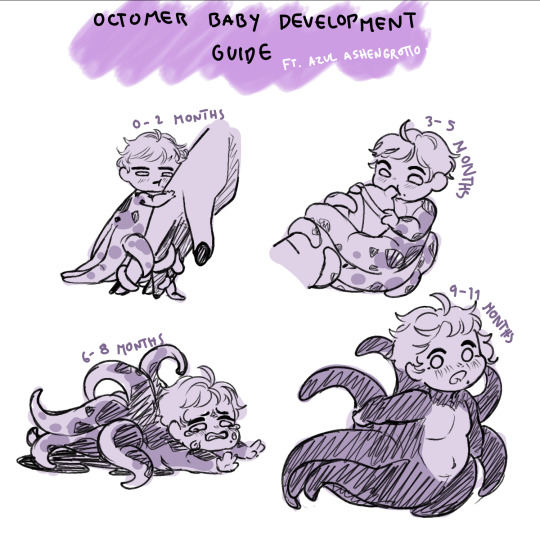
Octomer Baby Development: A guide for new parents (Part 2)
Right after your bundle of joy is newly hatched, it may need some special attention that other mer babies may not need. Often clingy and fussy when left alone, Octomer hatchlings have interesting differences that make raising them an entirely unique experience.
PHASE 2─THE HATCHLING:
0-2 Months:
Your baby has just hatched, and the first thing to note is its absolutely tiny size. Don't fret, as Octomers grow rapidly and will soon surpass your palm. At this stage, octomers can barely crawl around and will cling to their parents' hand for support and mobility. As they get exposed to light, their chromatophores develop and more colored speckles/marks will continue to appear all throught their body.
3-5 Months:
Your child should be slowly introduced to mushed foods instead of relying on liquids. It is recommended to also start introducing them to different kinds of meat, like clams (de-shelled) and shrimp.
An octomer baby is slowly starting to gain stength in all its arms, which include their suckers. They will start crawling around and grabbing things, and though slow in their movements, they have quite a strong grip on things. If parents are worried about their children grabbing onto something potentially dangerous, it is recommended to lather on a thin layer of whale fat onto things so they aren't able to grip it with their suckers.
6-8 Months:
Big developments will be happening around this timeframe, not only your octomer baby will get (and will continue to get) a growth spurt from being about 6 1/2" (16.5 cm) to a whopping 19" (50cm) ! Their appetite will also increase accordingly, so be sure to stock up on plenty of foods like kelp, plankton juice, and crab meat.
Their syphon and ink sac are fully developed, too, so expect a couple of accidental ink spewings from your baby.
9-11 Months:
At this point, your healthy octomer baby will be around 25.20" (64cm) and, if they are a hybrid between any landfolk type, they'll start transforming into their other species type. If that is the case, it is recommended that you start introducing your mer to land and the respective aspects of it, like crawling, breathing air, and, eventually, walking and eating warm foods.
Your baby's chromatophores will also be fully developed, and as such, the distinct markings that they'll have for the rest of their life will be fully visible─though still faded. Their water jet and arms will also be fully mobile and your octomer will start to swim around and even 'walk' upright.
BONUS:
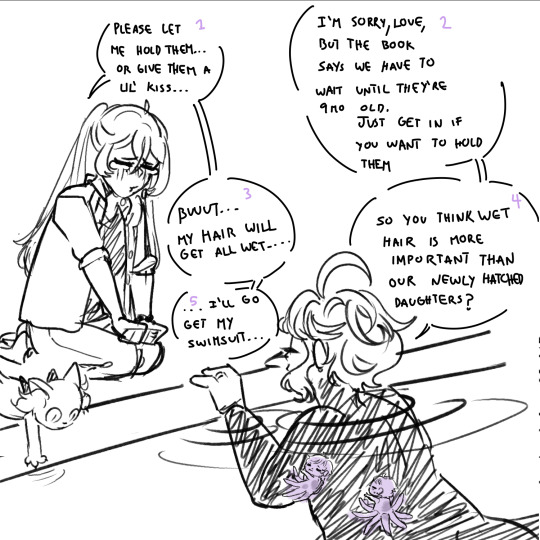
Yuu especially struggled with this phase.
#art stuff#twisted wonderland#fanart#azul ashengrotto#doodles#twst azul#twst#yuu fujisaki#twst yuu#twst oc#azuyuu#yuuazu#azul x yuu#yuu x azul
5K notes
·
View notes
Text
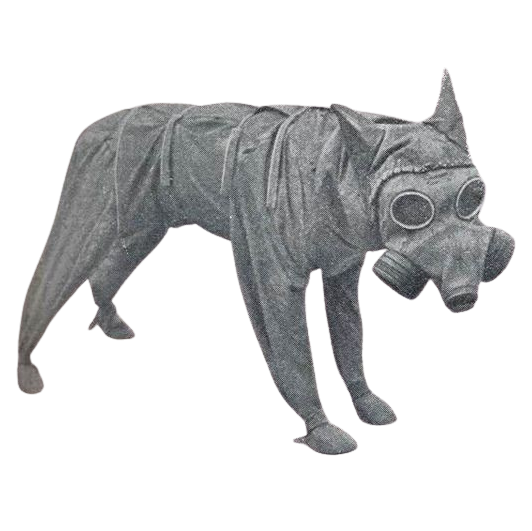
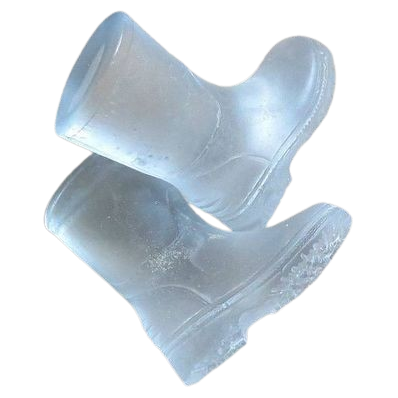

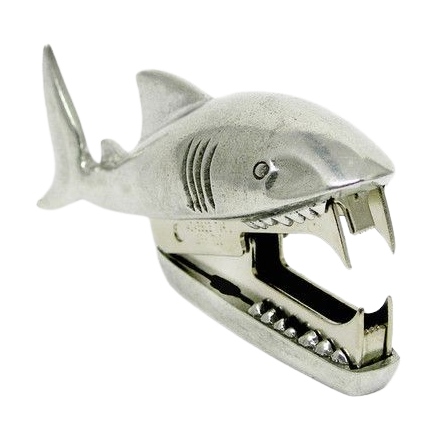

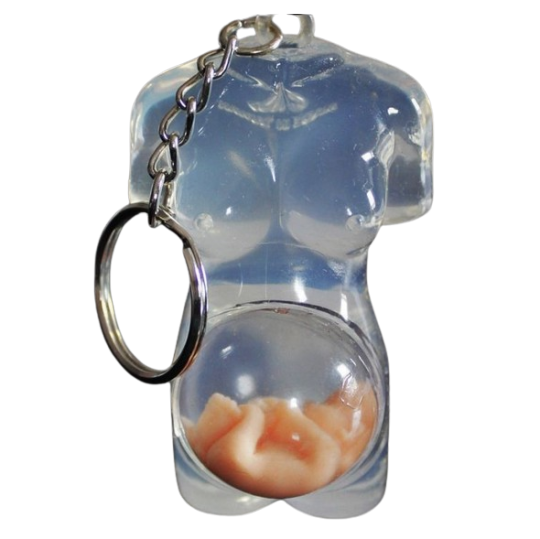
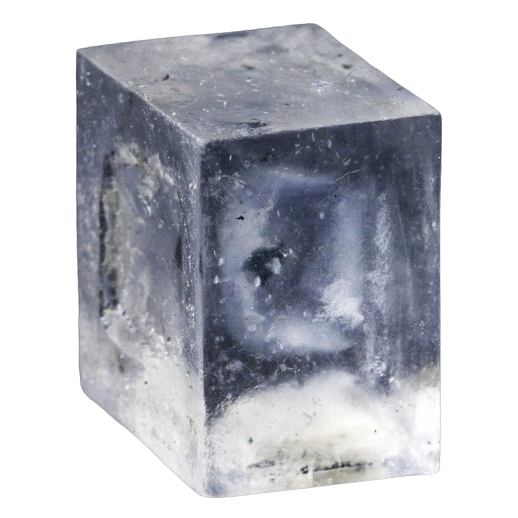
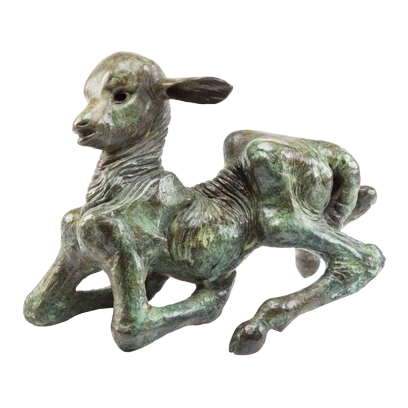
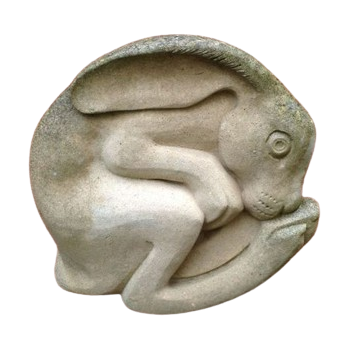
Random PNGs, part 173.
(1. Gas mask dog (?), 2. Glass boots (?), 3. "Lapinou des cendres" by Hélène Loussier, 4. Shark-shaped stapler by Jac Zagory, 5. Penguin soap (?), 6. Pregnant keychain, 7. Halite, 8. Sculpture by Anna Dębska, 9. Stone carved hare (?))
3K notes
·
View notes
Text
Rook Story Time Prompts
Tell a story or draw something based on the prompt you are sent/choose. You can try writing in character, as Rook, if you want! Have fun!
1. The first time Rook killed someone.
2. How Rook got their most prominent scar.
3. A time Rook got incredibly drunk.
4. A time Rook made a personal enemy.
5. Rook being seriously ill.
6. A time Rook was severely injured.
7. Rook being taught an important skill.
8. A time Rook argued with someone they care about.
9. Rook saying goodbye to a friend.
10. Rook attending a funeral.
11. Rook being recognized for an accomplishment.
12. Rook making a new friend.
13. Rook visiting a place they love.
14. Rook attending a celebration.
15. Rook breaking the law.
16. Rook falling in love for the first time.
17. Rook teaching someone else a skill.
18. Rook trying to impress someone.
19. A time Rook did something embarrassing.
20. A time Rook faced an overwhelming enemy.
FACTION SPECIFIC PROMPTS
21. GW!Rook undergoing the Joining.
22. GW!Rook encountering their first Darkspawn.
23. GW!Rook having a nightmare of the Archdemons.
+ New prompts just for Rook Thorne!
24. VJ!Rook disarming their first artifact.
25. VJ!Rook being attacked by the sentinels of Arlathan.
26. VJ!Rook exploring new Elvhen ruins.
+ New prompts just for Rook Aldwir!
27. MW!Rook tending to the gardens.
28. MW!Rook being inducted into the Watch.
29. MW!Rook exploring a new part of the Necropolis.
+ New prompts just for Rook Ingellvar!
30. LoF!Rook escorting an adventuring party.
31. LoF!Rook disarming a trap or solving a puzzle.
32. LoF!Rook fighting an aquatic enemy.
+ New prompts just for Rook Laidir!
33. Crow!Rook’s most dangerous contract.
34. Crow!Rook on an undercover mission.
35. Crow!Rook’s graduation from Fledgling to Assassin.
+ New prompts just for Rook de Riva!
36. SD!Rook smuggling people out of Minrathous.
37. SD!Rook participating in a large-scale act of civil disruption against the Magisterium.
38. SD!Rook breaking in somewhere to acquire vital information.
+ New prompts just for Rook Mercar!
& an expansion focusing on AUs!
#dragon age#veilguard#rook#datv#da veilguard#dragon age the veilguard#dragon age rook#ask game#writing game#writing prompts
760 notes
·
View notes
Text
"Tintin, quel âge as-tu ?"
Today marks 96 years of The Adventures of Tintin, and readers have spent at least the last 78 of those years asking the same question: "How old is Tintin?"
The series is infamously coy about giving a definite answer, as was its creator, but I argue in the first part of this post that 1) there was indeed a specific intended age range for Tintin and 2) it is very much possible, using evidence from many different sources including the albums themselves, Tintin magazine, other BDs of the time, and interviews with Hergé, to say exactly what that age range was. Let me be very clear: I'm specifically making an argument about how old Hergé saw him as and how old Hergé wanted him to be seen as.
The second part is less concrete; it presents how a few scholars have interpreted the ambiguity of Tintin's age, plus some of my own thoughts about it that build on their claims. That part is less trying to find an answer to the age question and more trying to explain why his age is so much in question.
This is a long post.
I. Intent
Official sources
When asked about Tintin's age in a 1960 interview for Cinq colonnes à la une, Hergé judged that "il doit rester aux environs de quinze ans" ("he must still be around 15 years old," 0:33-0:44).
In 1962, he gave a very similar response on the Canadian program Premier Plan: "Une quinzaine d'années ? Quinze ans, seize ans, je ne sais pas, moi" ("About 15? 15, 16, I don't know"). "Donc c'est l'adolescent" ("So he's a teenager"), pursues the interviewer, and Hergé answers with a firm yes.
Nearly ten years later, in 1970, he added some nuance: "What age do I give him? I don't know... 17? In my mind, he was about 14 or 15 when I created him, a Boy Scout, and he practically hasn't budged. Let's say that he's picked up three or four years in forty years... All right, let's take the average: 15 plus 4, 19." (translation mine)
In 1979, his interviewer on Apostrophes preempted him on the age question, saying that "c'est un reporter de quinze ans" ("he's a 15-year-old reporter"). Hergé agreed: "C'est ça, à peu près" ("That's right, more or less").
Today, the official Tintin website run by Moulinsart declares him to be "Seize, dix-sept ans (dix-huit tout au plus !)," that is, "16, 17 years old (18 at most!)."
Responses to reader questions in the Journal Tintin
Early in the Journal Tintin's run, between 1946 and 1954, readers who wrote in with questions had a chance to see the responses to their letters published in the magazine each week. Supposedly it would be Tintin himself who was answering - questions addressed to him would be answered in first person, which probably only increased the urge to ask about personal details. So there were naturally many questions about his age, which provoked a range of responses.
Who was actually answering the letters? It's hard to say. But seeing as the responses were being published in the official Tintin Magazine as the voice of Tintin himself, Hergé would surely have been at least consulted on questions concerning his character, especially as the team running the magazine was still very small when it was regularly publishing responses.
The most common response was to dodge the question entirely. The stock phrases were "Qu'importe mon âge ?" and "Tintin n'a pas d'âge !" ("What does my age matter?" "Tintin has no age!").
In a small number of cases they related Tintin's age to that of his readers; an 11 1/2 year old was told that Tintin can be "l'âge que tu souhaites : entre dix et vingt ans !" ("whatever age you want: between 10 and 20!", 1953), and for a couple others, where the age of the writer wasn't listed, Tintin's age is "un peu plus que le tien" ("a little older than you," 1951) or "un peu moins que le double du tien" ("a little less than twice your age," 1950). The target audience of the Journal Tintin - as it was for the Petit Vingtième, and for comics magazines of the time generally - was 8-15 year olds.
The only definite answer that appeared with regularity put Tintin's age between 15 and 20:





(TIntin nos. 19, May 8, 1947; 26, June 26, 1947; 6, February 5, 1948; 2, January 12, 1950; 9, February 27, 1947. The second and third examples also have Tintin declare that "I've travelled so much that I no longer remember where I was born," a fine example of the de-Belgicanization he underwent after the early years.)
("As I've already told several of my friends, I'm older than 15 but younger than 20." (1947) "My age? Let's say 15… or a little older." (1947) "My age? Between 15 and 20 years old." (1948) "Tintin? He has no age! Seeing him move about, he seems to be about 15." (1950) "I'm not yet 20 but I'm older than 15." (1947))
Real-life incarnations of Tintin
When the end of Soviets was celebrated with "Tintin" arriving at the Gare du Nord in Brussels, the role was played by 15-year-old Lucien Pepermans. When the event was repeated for the end of Congo, two years later, Pepermans was replaced by Henri Dendoncker, age 14. About thirty years after that, Jean-Pierre Talbot was declared Tintin's spitting image at 16 ("Same age, same silhouette, same face, same hair," reads the announcement of his casting in the Journal Tintin). He was 20 at most when Blue Oranges (released 1964) was filmed. Hergé told Numa Sadoul that he unconsciously based Tintin in Soviets on his younger brother Paul, who was 16 when it started. Additionally, Palle Huld, often cited as an inspiration for Tintin, completed a tour of the world in 44 days in 1928 at age 15 (and in plus-fours).




(Lucien Pepermans, Henri Dendoncker, Jean-Pierre Talbot, Palle Huld)
In the play Tintin et le mystère du diamant bleu (1941), which Hergé was very involved in the writing and production of, the role of Tintin was played by Mlle. Jeanne Rubens, a woman - a common theater trick for portraying young boys. He was played by a woman again in Radio Luxembourg's 1950s audio adaptations: Claude Vincent, "qui interprétait à merveille les rôles d’enfants et d’adolescents" ("who played children's and adolescents' roles wonderfully"), was the voice of Tintin. Sadly those broadcasts appear to be lost, but she can still be heard in the likely similar role of Alix.

(Shared on forum-tintinophile.com, "Tintin aux Indes, ou le mystère du diamant bleu." Certainly the only adaptation that got his height difference with the Thompsons right.)
In 1959, the Journal Tintin invited readers who thought they looked like Tintin to send in their pictures; five candidates for "Tintin's lookalike" were chosen by the magazine and presented to the readers for them to vote on. The winner was a 15-year-old, and while the ages of the other contestants aren't listed, they appear to be the same age or younger.


(Tintin nos. 25, June 24, 1959 & 31, August 5, 1959)
Comparisons with contemporary characters
Mainstream BD in the first half of the 20th century was not particularly inventive, especially as it was contending with its relative youth as a medium, a focus on the children's market, and, especially after WWII, heavy scrutiny from both religious and secular moral watchdogs. In the specific case of the Journal Tintin, Hergé's iron-fisted artistic direction in the early years led to a high level of artistic homogeneity across the magazine, while restrictions on the types of stories that could be told (from both the threat of censors and expectations about reader interests) limited variety in plots, characters, and settings.
All that is to say that a lot of what was being published alongside Tintin in the 40s and 50s looked more or less like Tintin, and even was likely directly modeled on it, which makes it useful for comparison. The protagonists of the time can be generally divided by age into children, the "15-20" range, young men, and middle-aged men. Each category is visually distinct (comics are a visual medium!) and each results in a slightly different kind of story with different character dynamics.
Here's Tintin with a couple of the teenage protagonists that appeared alongside him in his magazine:



(L'Affaire Tournesol (1956), p. 51; La Griffe Noire, Tintin no. 6, February 5, 1958; Les Deux Visages de Kid Ordinn, Tintin no. 1, January 2, 1957)
Hergé's no. 2 collaborator Jacques Martin created Alix (center, 1948), a Roman Gaul confirmed to be 16 in the original albums. Chick Bill (right, 1955), who in looks and narrative role is effectively just Tintin as a cowboy, is identified (by none other than Franquin) with the 15-20 age range. Some shared visual markers of their youth are a short and slight build, rounded shoulders, a round head, and a soft jawline. While all very independent, they are all three semi-accompanied by a much older man and a child sidekick.
Now, here are some examples of characters from the next age range up:



(L'énigmatique Monsieur Barelli, Tintin no. 44, November 2, 1950; L'ouragan de feu, Tintin (Kuifje) no. 37, September 15, 1960; Défi à Ric Hochet, Tintin (Kuifje) no. 8, February 25, 1964)
Hergé's no. 1 collaborator Bob de Moor had a humor-adventure series using the same style as Hergé, but his character, stage actor Georges Barelli (left, 1950), is a grown man. Martin's second series was required by publishers to somehow be a modern AU of Alix, but Alix's counterpart, reporter in the same way that Tintin is a reporter Guy Lefranc (center, 1952), is clearly older than him. So-called reporter, really amateur detective Ric Hochet (yes, that's his name, right, 1955) is kind of an odd case; he started out a child, then looked basically exactly like Chick Bill (they were both drawn by the same artist, Tibet), then finally settled into his final form as a young man in his mid-twenties - a 1969 album places him at age 26. All three own their own cars (admittedly a moot point for Alix and Chick), and, compared to their teenage counterparts, they're much more likely to have friends and colleagues their own age instead of being supervised by someone older.
It should be clear from these six pictures that Tintin was not drawn in a way meant to make readers think he was an adult. And besides, there's really no reason to believe that Hergé, who once declared that "my primary objective is to be legible. The rest follows," would have chosen to give his main and titular character an appearance that was somehow deceptive. I'm prepared to say with confidence that Tintin looks young because he's supposed to be seen as young.
Textual evidence
For this section, I first look at a few ways that the albums actively present Tintin as a non-adult character. However, most of what follows is about showing that what happens in the albums does not contradict the argument that Tintin is intended to be a teenager. The Adventures of Tintin may be deceptively timeless, but not only is the series nearly a century old, it also was written during a time of extremely rapid and intense social, cultural, and technological change. Consequently, I want to make sure that I'm not judging the past with the attitudes of the present; in order to put the series in its proper context, I try to identify viewpoints and conventions expressed in texts created at the same time (and, when possible, by the same author) to see if a teenaged Tintin fits in with them.
In looking over how other characters refer to him across the albums, one sees that Tintin's most distinctive feature to those around him is his youth. This is, I think, more visible in the original French, where other characters address or describe him with a whole array of words commonly used for children: jeune homme, (jeune) garçon, gamin, galopin, blanc-bec, enfant de choeur, fiston, freluquet, moussaillon, (mon) petit (used as a noun), and morveux, not to mention many, many instances of characters appending "jeune" or "petit" to another word ("reporter," for instance). In English, he's variously (a) young man, (young) boy, kid, boyo, whippersnapper, wonderboy, lad, brat, puppy, young fellow-me-lad, and cabin-boy, along with liberal use of the corresponding adjectives "young" and "little." (I've collected specific panel examples for reference in another post.)
As @professorcalculusstanaccount has pointed out, there's no question of Tintin being called up for the draft as Haddock is in Black Gold; that album also contains the only example of Tintin's competency being questioned because of his age, on page 7: "So you're the new radio officer... You look a bit young to me..." (There's one similar remark, in America, after Tintin is injured in a car accident on page 6: "The poor kid..." "He looks so young...") Him not being called to war is particularly striking because Belgium historically required young men to do compulsory military service at age 18 or 19, after which they would be enrolled in the reserve army (p. 274). Thanks to a hard-to-translate joke in the original French for Emerald (below), we know that military service exists in Tintin's world and that the Thompsons have done theirs; Hergé did his at age 19, and then was called up from the reserves in 1939, interrupting the magazine publication of, precisely, Black Gold. Given his longtime anti-war stance and the peace sign sticker he wears in Picaros, though, one can easily imagine Tintin becoming a conscientious objector after it was legalized in 1964 - but by 1964, most of the series was already over.

(Les Bijoux de la Castafiore, p. 37)
He also doesn't dress like an adult: the plus-fours look very childish after the 1930s, as @illegally-blind-and-deaf pointed out. He also never wears a proper hat, only a flat cap in a few early adventures, and from Temple on (that is, after 1948) he runs around in his shirt and sweater with no tie or jacket. Some of that can be put down to the importance Hergé placed on his characters being maximally recognizable, but it certainly doesn't make Tintin look any older - look at a few of Hergé's crowd scenes and compare how the background characters are dressed.
Next, he doesn't seem to ever need to shave. In fact, in the original French for Black Island, Tintin remarks that the bad guys have gotten away "à mon nez et à ma barbe," an expression equivalent in English to "right under my nose" but literally "at my nose and at my beard," to which Snowy incredulously responds "Your beard? What beard?"

(L'Île Noire, p. 29)
It's true that nearly everyone who meets Tintin, including his adult friends, addresses him respectfully with the formal pronoun "vous" instead of with the informal "tu," as you typically would for someone much younger than you. However, Pierre Assouline attributes this to a dislike of over-familiarity on Hergé's part, citing him as saying that "Le tutoiement est la fausse monnaie de l'amitié" ("Using 'tu' is the counterfeit money of friendship").
(There are a few moments where Haddock slips and uses tu with Tintin, but I won't go into them here. Suffice to say that the majority of them are indeed moments where he's treating Tintin more as a child.)
Much has been made of Tintin's nonchalance about drinking alcohol as proof of adulthood, but evidence from other BDs indicates that this perception is a result of a shift away from historically looser attitudes towards drinking. Early comics for children frequently carried moralizing messages, but there's no marked moralizing present around youths drinking like there is around them smoking.
Compare, for example, the difference in tone between these two Quick & Flupke pages, where the kids are sternly warned off from tobacco...


(Originally published in Le Petit Vingtième nos. 4, January 28, 1932 & 43, October 24, 1935)
...Versus this gag, where Flupke's own relatives getting him drunk on New Year's over his protests is played entirely for humor.


(Le Petit Vingtième no. 1, January 3, 1935. "Tu es un homme et tu dois boire!")
There was even a follow-up comic at the same time the year after, in which Flupke imagines the alcohol he'll be plied with on January 1st and attempts to move to the North Pole to avoid it.
If a kid as young as Flupke is being given alcohol, then Tintin really doesn't have to be much older to be drinking as well. In fact, one might even note an echo between Flupke's reluctance to drink here and Tintin's in Picaros, when he's pressured to take a swig of whisky by Arumbaya custom (p. 34). On the other hand, since Quick and Flupke are so young, the ban on smoking is stronger for them. Tintin is old enough to occasionally be offered a cigarette, but still young enough that he always must refuse: Hergé was adamant that Tintin remain a good model because of the children who identified with him, while Haddock smoking his pipe, for example, never raised the same issue.
Beyond that, for a non-Hergé example and a later one (from 1960), here's child tennis prodigy Jari, hero of an eponymous strip in the Journal Tintin. He's just bicycled from Belgium to the Netherlands and wants a refreshment, so he goes to a drink stand and orders a beer - and no one bats an eye. Similarly, the only alcohol that Tintin orders casually, in a cafe or pub, is beer (Golden Claws p. 2, Black Island p. 41).

(Jari et le Plan Z, Tintin (Kuifje) no. 40, October 6, 1960)
At the same time, this relaxed attitude has limits. Tintin won't share a friendly drink with Haddock, for example when returning to Marlinspike after an excursion (though Haddock pours two glasses anyway in Affair (p. 3)). Calculus scolds Haddock severely when he thinks that Haddock has given Tintin champagne at breakfast in Tibet (p. 4: "Vous avez bien tort de lui faire boire du champagne de grand matin, à ce garçon !…"). Later in that same album, Haddock drunkenly warns Tintin against alcohol, telling him it's "very bad for young people like you!" (p. 38).
Next, while Tintin is undeniably capable of driving a car, there's actually no indication outside of the earliest stories that he can legally drive. (A quick Google search also tells me that Belgium has historically been notoriously lax on road safety.) At no point after the first four albums - that is, after Hergé became interested in telling a story that makes logical sense, a development typically placed at Blue Lotus - does Tintin drive a car that was acquired legally, not commandeered or outright stolen. (In Soviets and Congo he buys a car; in Cigars he drives the two Rajaijah victims to the asylum, though I doubt anyone was worried about him getting pulled over in the jungle.) On the few occasions where there isn't an emergency, it's always Haddock who drives; see for example Crystal Balls or the few pages of Thérmozéro. When Tintin finally gets a vehicle of his own, in Picaros, it's... a motorbike, which one can get a license for at a younger age than for a car. And in Alph-Art, where the motorbike plays a much larger role, Haddock still drives Tintin into town (p. 25) - and then gets left in the car while Tintin investigates!
Hergé also apparently didn't think flying a plane was particularly difficult. In Jo et Zette, one of his other series, Hergé has little Jo be able to fly his father's "Stratonef" and even land it from a glide, despite only ever hearing his father talk about how to fly it. Over the course of the two-part story (Le Testament de M. Pump and Destination New-York), Jo manages multiple successful flights - more than Tintin ever does! - despite unambiguously being a child.

(Destination New-York, p. 41)
And as with the cars, every plane Tintin ever flies is stolen, so whether he has a legal license or not really doesn't matter.
The same goes for his guns. In all but the first albums and Ear where, surprised in his flat, he really does pull a revolver out of nowhere, Tintin's guns are explicitly either given to him or taken from a disarmed enemy. The series doesn't make a point of him owning and carrying his own gun - just the opposite. And while it seems to us now that Tintin has a lot of firearm use for a children's comic, proficiency with guns was honestly a genre expectation for all adventure heroes of the time (just don't put a gun on your cover). For example, Chang, who from his introduction on acts like a second Tintin, wields a pistol at the end of Lotus and is even implied to be the one who makes the shot that breaks Didi's sword despite appearing even younger than Tintin. (See also the previous section of this post; Chick Bill is carrying a gun in the picture I included.) What's more, the gunplay in Tintin is actually a step down from its predecessor Totor, where Hergé's titular Boy Scout kills a man with a rifle shot to the face.
In short, Tintin is able to do a lot of things he shouldn't legally be able to do by simply not doing them legally.
The fact that Tintin lives alone isn't necessarily a mark of maturity either. It's hardly uncommon for a young adventure protagonist to be unusually unsupervised; it's effectively a demand of the genre. Hergé learned why that is from experience when he created Jo et Zette for the editor of the French, ultra-Catholic children's magazine Coeurs Vaillants, who had raised concerns about how unrealistic Tintin was. In Hergé's own (translated) words:


(From Entretiens avec Hergé, reproduced & translated in The Comics Journal no. 250, p. 191)
Parents are a nuisance, one that Hergé was only too happy to dispense with in Tintin's case. And besides, Tintin isn't completely alone forever; with the introduction of the Marlinspike "family," not to mention Marlinspike Hall itself, during the war, he at least ends up with a home and some adult supervision, however dubious it may be at times.
As for his schooling, according to a report on the Belgian education system from 1932, education was only compulsory there (not to mention free) from ages 6 to 14. That same report records that in 1928, the number of students in the higher level of secondary education - corresponding to high school in American terms - was only 1% of the number of students enrolled in compulsory primary school. Even adjusting for the fact that primary education enrolls children for twice as long, the percentage is still a paltry 2.6%. And then the number of students in university that same year was only about three-quarters of the number of students in secondary education.
What that means is that at the time when Tintin was getting started, only very, very few people stayed in school beyond age 14. Hergé himself was one of those few, but to many of his readers in the early years, the idea that Tintin was already working at age 14 or 15 would have been not just reasonable but recognizable - especially as he has no apparent family to support him. (Not that Tintin isn't knowledgeable: judging from the number of books in his apartment, we can presume that he's quite the autodidact.) Of course public education was broadened after WWII, but by then the character was already firmly established.
As for how Tintin is already a reporter, well, Hergé freely admitted that he gave him the job just because that's what he thought was cool at the time. "Of course it was a pretext," he said on British radio in 1977. (The announcer for that interview describes Tintin as "a 16-year-old Belgian boy with a strange lick of hair, a pair of plus-fours, and a terrier." In it Hergé, questioned about the outsize success of his series, responds that for him "he [Tintin] keeps to be a little boy. Only that.") The tone of the series would be very different if Tintin were just an office clerk or a paperboy, after all - and besides, all but the youngest readers of Le Petit Vingtième would have understood that it's not a real newspaper, just a little children's magazine, so the idea of it having its own official reporter was not to be taken fully seriously.
It's important to remember that our current cultural idea of the teenager as a separate, unique stage between childhood and adulthood was largely a post-WWII American innovation - in fact, the word "teenager" only entered popular use in the 1940s. By contrast, fully half of the Adventures of Tintin (up to the first 2/3 of Crystal Balls) were written either before or during WWII. Hergé himself, born in 1907, began submitting illustrations to a magazine (Le Boy-Scout) at 14, was hired at the Vingtième Siècle at 18, created Totor and did his military service, reaching the rank of sergeant, at 19, and before turning 22 had been given full responsibility for creating and running the Petit Vingtième, gotten engaged to his first wife, Germaine Kieckens, and created Tintin. Being young looked different then.
To close this section I'll also note that, as far as I can tell, positioning Tintin as a teenager never seemed to pose much of a problem to anyone reading the series while it was actively running. Anecdotally, nearly every published source I've read takes for granted that he's an adolescent, and an exception like writer of multiple books on Tintin Renaud Nattiez saying on the air in 2016 that he thinks Tintin is at least 22 (~03:30-03:50) seems to be a uniquely 21st-century development.
TL;DR: Everything I can find indicates that Tintin was always intended to be around 15, and never older than 20, years old.
II. Interpretation
Finally, it's important to not overstate Hergé's commitment to realism. At the end of the day, Tintin can do whatever the story needs him to be able to do, because he's the protagonist of a very straightforward adventure serial. He's always been aspirational, even for Hergé himself: "Tintin is me the way I'd like to be: heroic, flawless." And yet Tintin, victim of its own success, has always been held to a higher standard of realism than its fellow comics, not to mention a higher level of scrutiny in general. Even if, as I've tried to demonstrate, Tintin's feats aren't entirely out of the range of possibility (or at least the norm for comics characters) for his time period, I'm not arguing that he's supposed to be a perfectly accurate representation of the average boy of any point in the mid-20th century. I also don't deny that he typically does act like an adult. So the guiding question here is: How can this dual nature of Tintin's - his adolescent status and adult aspects - be interpreted?
Jean-Marie Apostolidès writes that as "il unifie dans sa personne deux aspects opposés de l’existence, l’enfance et l’âge adulte" ("he brings together in his person two opposing aspects of existence, childhood and adulthood"), Tintin represents "un mythe réconciliatoire" ("a reconciliatory myth") of which the "fonction implicite est de ressouder entre deux générations une confiance brisée" ("implicit function is to mend a broken trust between two generations"). He names this type of child-adult character the "surenfant" ("superchild"), and argues that it is specific to the 20th century and the cultural shock of WWI.
For Pol Vandromme, who wrote the first book of analysis on Tintin (or on any BD), Tintin is simply a perfected version of the teenage boy, one that other teenage boys can aspire to. First, he cites as conventional wisdom that Tintin is around 15, and concludes that "c'est dans tous les cas un adolescent" ("in any case he's a teenager"). While Vandromme accepts that Tintin is presented as a teenager, he also points out that Tintin doesn't represent the experience of being a teenager; Tintin "ne présente [...] que les apparences de l'adolescence" ("only displays the appearance of adolescence") because he's so self-assured and stable, traits antithetical to "l'époque de la métamorphose" ("the time of metamorphosis") that is adolescence.
And yet "il [Tintin] demure malgré tout suffisamment proche pour que les garçons se disent qu'ils auront un jour la chance de lui ressembler, d'imiter son style de vie. [...] Ce que Tintin propose à ces garçons de quinze ans, c'est la figure achevée de leur âge. Il les venge de leurs insuffisances" ("he [Tintin] remains all the same close [i.e. similar] enough that these boys tell themselves that one day they'll have the chance to be like him, to imitate his way of life. [...] What Tintin offers to these 15-year-old boys is the perfected version of their age [group]. He makes up for their shortcomings"). Consequently, having put themselves in Tintin's place, these boys "ont l'illusion d'être déjà de la tribu des jeunes gens qui ont découvert dans leur sac de voyage les clefs qui ouvrent les portes de la fable du monde" ("have the illusion of already being part of the clan of young people who have discovered in their travel bag the keys that open the doors of the world's fable"). In plainer language, being able to identify with Tintin as an apparent peer lets teens imagine themselves as being more capable and powerful than their age allows in reality, an attractive illusion.
I'll add that the static quality of Tintin as a character that Vandromme identifies is dictated by the form of the series. When presented with a teenage protagonist in a work, the novelistic expectation is that what follows will be some kind of bildungsroman, where the events of the story will push the protagonist to change and mature into adulthood. However, I believe that it's a mistake to approach The Adventures of Tintin as a novel when it is fundamentally a serial - even late in his career, when he didn't need to do prepublication anymore, Hergé's approach to plot was still oriented around the page-a-week format. Serial characters, as a rule, change very little. Tintin gets compared to Sherlock Holmes more than once in the series, and it's also true on a meta level: Holmes has a few minor moments of character development, but he largely remains exactly the same over the course of Conan Doyle's stories, which were likewise published in a magazine. In a true serial, the status quo is god, because the main aim of the serial is to perpetuate itself - theoretically forever. And so Watson always finds a reason to return to Baker Street, and Tintin never gets old enough to think of settling down and getting a real job.
Like Holmes, Tintin does change and grow somewhat as a character over the course of the series, but also like Holmes, that growth is not a planned arc with an endpoint, as you would expect in a novel. Instead, it's just a result of Hergé himself maturing and changing. In his contribution to L'archipel Tintin, Benoît Peeters notes that "Grande est la tentation, pour beaucoup, de lire la série comme une totalité, un monument où tout signifierait" ("The temptation is great, for many, to read the series as a totality, a monument where everything has meaning"). And yet he declares that "si accomplies soient-elles... Les Aventures de Tintin se sont élaborées en l'absence de tout grand dessein" ("however polished they may be... The Adventures of Tintin were created in the absence of any grand design"), citing the testimonies of both Hergé and those who knew him at the beginning of the series. Hergé never really had a plan for Tintin as a character; he really did just put him in situations over and over again for a little more than fifty years. However, now that the series is only read in album format and serial publishing is less common, the "temptation" Peeters describes is even stronger. This mismatch in narrative expectations may be part of why modern readers might struggle to view Tintin as a teenaged character.
There's one more element to Tintin's strangeness: the world of the series was built around Tintin himself to facilitate his adventures. Vandromme recalls the fact, so obvious that it's easily forgetten, that "Tintin étant ce qu'il est et ne pouvant être un autre, infléchit l'intrigue d'une certaine manière. [...] Remplacez Tintin par le père Fenouillard et il vous faudra modifier l'album de fond en comble. Dans un roman les personnages déterminent les événements avant d'être déterminés par eux" (Tintin, being who he is and unable to be anyone else, influences the story in a certain way. [...] Replace Tintin with the father of the Fenouillards [character from a 19th-century comic about the misadventures of a French family abroad, n.b.] and you'll have to change the album from top to bottom. In a novel, the characters define the events before the events define them"). This point is especially relevant to Tintin given that the series' beginning was, to put it mildly, haphazard. Starting from Soviets, where Tintin is alone with his dog in a bizarre world where he can sneeze down a sewer grate, cut down a tree with a pocketknife, or fistfight a bear - whatever it takes to keep the plot moving - set a precedent for the character: that Tintin, and nobody else, will always triumph over whatever enemy or obstacle he is faced with.
Because it's founded on Tintin himself, there are no real adults in the Adventures, and in fact there can't be any. Preserving Tintin's Soviets-era boy hero status as the world of the series became steadily larger and more realistic created a kind of 'competency warp' where Tintin, along with his young "doubles," Chang and Zorrino, is effectively always the most capable, the master of the situation, while those closest to him who are much older (the Thompsons, Haddock, Calculus...) tend to act rather childishly. I think it's telling that the 1946 introduction of Blake & Mortimer is often hailed in terms like these: that "pour la première fois, les héros n'étaient pas des enfants, mais des adultes responsables dont la psychologie était en parfaite harmonie avec leurs fonctions" ("for the first time, the heroes were not children, but responsible adults whose psychology was in perfect harmony with their roles," emphasis mine). All the major adult characters in Tintin had been introduced at that point, but apparently none of them qualified as "responsible" or properly suited for their positions.
Apostolidès similarly notes a deforming effect: "Tintin est un adolescent qui, sans jamais entrer dans l’âge adulte, rajeunit le monde en se confrontant à lui. Au lieu que le personnage se soumette passivement au monde adulte, s’intègre dans une histoire, vieillisse et meure, c’est l’univers extérieur qui se fige dans le temps au contact du héros" ("Tintin is an adolescent who, without ever entering adulthood, makes the world younger by confronting it. Instead of the character submitting himself passively to the adult world, fitting in to a history, getting older and dying, it's the outside world that freezes in time at the hero's touch"). Not only does Tintin resist adulthood himself, he also protects others from its effects.
There are characters who escape the warp, but they must stay on the very edges of Tintin's orbit. One example is the efficient and no-nonsense Mr. Baxter from the Moon books. He has a real job: he's director of the atomic center, and every time we see him he's actually doing it. He also remains disengaged from the antics of the Marlinspike crew, often exasperated and confused by them. They don't belong in his serious space program, and he doesn't belong in their funny adventure series - hence the clash. Another (and very different) example is Jolyon Wagg. I wish I could remember where I read it, but I once saw it pointed out that Tintin and Wagg almost completely ignore each other; their only direct interaction in the whole series is saying hello to each other exactly once (Emerald p. 17). The unidentified author's point was that Wagg inhabits a world so intensely banal, so different from Tintin's - one with community organizations, salesman jobs, an old mother, an Uncle Anatole, a wife and (a lot of) children - that the two can't even come into contact. Wagg may be almost preternaturally obnoxious, but he's also a genuinely ordinary man in a way that the major characters really aren't.
Tintin must remain the sole and main driver of action, because if he isn't, the series would have to change fundamentally. That means no other character can threaten his role by being more competent and responsible than him - and so the adults become ridiculous and/or irrelevant, and Chang and Zorrino are only allowed to act for one album each. And yet Hergé created Tintin as a teenager, and suggested that a Tintin who progressed past teenagerhood would also grow out of adventure: "Il est difficile, pour un personnage comme ça, à le faire vieillir. Parce que s'il vieillit, il va avoir vingt ans, il va avoir vingt-deux ans, il va rencontrer une jolie fille, il va se marier, il va avoir des enfants..." ("It's hard to make a character like that get older. Because if he gets older, he'll be 20, he'll be 22, he'll meet a pretty girl, he'll get married, he'll have children..."). Tintin passing into adulthood, 'real' adulthood, symbolized here by settling down and starting a family, would make the series just as unsustainable as demoting him to a more technically age-appropriate role would; both sides of the tension between Tintin's youth and his maturity are required to make him a proper adventure hero for children.
And so he remained, as he remains today, the world's most competent teenager.
#tintin#hergé#journal tintin#le petit vingtième#resources#also featuring:#jean-pierre talbot#quick et flupke#jo et zette#alix#chick bill#monsieur barelli#lefranc#ric hochet#jari
572 notes
·
View notes
Text
Wrong Number, Right Recipe (9/9)
Pt. 9
Part: 1 2 3 4 5 6 7 8 9
Featuring: Satoru Gojo
Warnings: suggestive
Summary: strangers to friends to lovers! An accidental text from the wrong number leads to the meeting of you and satoru gojo, a baker from the pastry shop down the street of your office.
Author's note: Just some silly texts after they got together🥹 I hope you guys enjoyed this series as much as I did! Writing for a couple that matches each others freak is so fun😽








Divider credit: @animatedglittergraphics-n-more
Taglist: @thulhu @heiejdhdh @needtoloveoutloud @jurrasicpork @sorenflyinn @twinkling-moonlillie @realalpacorn @lastbreathtaken @zayuriluvs @logoleptic-since-06 @whore4dilfs0 @whozeurdaddy @fhfnejd @maddietries @s4ikooo1 @des-todoroki @nanamineedstherapy
#jjk#jjk fluff#gojo smau#gojo x reader#jjk smau#jjk x reader#gojo fluff#fluff#smau#jujutsu kaisen fluff#gojo satoru#jjk satoru#slight smut#jjk smut
403 notes
·
View notes
Text
Dark Disney Villains/Protagonists Masterlist:



1-Male! Cruella De Vil x Soft-hearted Reader
2-Male! Evil King x Wife! Reader Part 2
3-Platonic Father Tarzan x Reader
4-Platonic Dark! Emperor Kuzco x Child Reader
5-Dark Platonic Male! Maleficent x Child! Reader
6-Dark Male! Ariel x Reader
7- Dark Male Cinderella x Reader
8-Dark Male! White King X Alice's Mother! Reader
9-Dark Platonic! Mufasa X Human child Reader
10-Dark Male! Kim Possible x reader x Dark Male! Shego
11-Dark Male Lord Tremaine X Cinderella's mother! Reader
12-
13-
14-
15-
#tw: toxic relationships#platonic yandere#reader insert#daughter reader#possessive#romantic yandere#masterlist#disney x reader
701 notes
·
View notes
Text
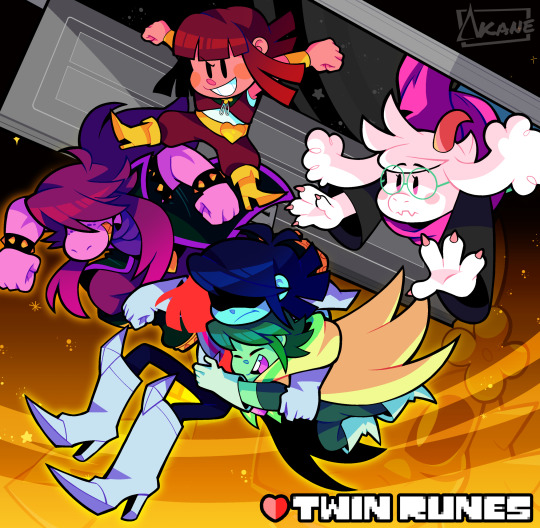
TWIN RUNES MASTERPOST
Because of the limited amount of links you can put into a post, you can find the links to each page in these sub-posts:
To be continued...
FAQ under the cut!
TWIN RUNES MINI COMICS
Glasses - Frisk Dance - But nobody came - An acquired taste -Smalltalk - All You Can Eat - Page 75 EXTRA - Page 84 EXTRA - Kris the Detective - Don't Try This at Home
AFTER RUNES:
Not-To-Do-List - Beach Episode - Salute the Frick - Morning Routine - The Universe is a Hologram - Trick as a Treat - Taste the Painbow - Dungeon Doofus - Tour de Nope - Explosive Start - Conveniently shaped... - Sibling Bonding - Home for Iinfite Avoidance - Be Mine Moss
PRE-RUNES:
Fallen down - First steps - Press [C] - Eye opening - Whatstheirface - This Nugget is Not in Service Acid reflux - Connection issues - Normal Human Behavior
TWIN ROOMIES:
______________________________________________________________
TWIN RUNES - FAQ
What exactly is this AU about? Twin Runes is essentially a comedic crossover AU between the universes of Deltarune and Undertale. No fancy nicnacs. Just the characters being their chaotic selves. But there might be some darkness lurking up ahead... ____________________
When is the next comic? The comic updates most Sundays at 6:30 PM Central European Time. ____________________
Why is this AU called Twin Runes? The name is more or less a play on the typical naming format of most AU's by featuring the "Runes" part. There are no literal Twin Runes. The whole name is more of a stand in for Undertale and Deltarune as parallel worlds. Hence the "Twin" part. ____________________
When does Twin Runes take place? This AU takes place between a hypothetical Chapter 3 and Chapter 4 of Deltarune. On the Undertale side of things, it takes place post neutral route just as Frisk was about to deliver Undyne's letter to Alphys.
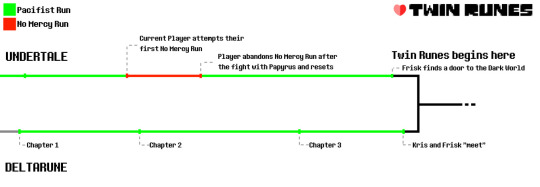
How many pages are there going to be? The script for this comic estimates that the comic is going to be 137 pages long (if I don't make any major changes). ____________________
What software do you use to make your art/the comic? I use Clip Studio Paint. ____________________
Is the Player a thing in this AU? The Player(s) lost control over both human children as soon as Frisk entered the world of Deltarune. Essentially, the reader takes on the role of the Player. You have no influence on the outcome of the story anymore. All you can do is watch. Both Kris and Frisk refer to the Player as "It" and "the THING". ____________________
Is there going to be a Weird Route? Due to the lack of Player, all choices made by Kris are now their own. How to engage in battle all depends on Kris, and not the Player. Because of that, there are NO DIFFERENT ROUTES. There is only one route and that one is based on Kris' choices. Because of the lack of save points, there is no "what-if" scenario. ____________________
When Chapter 3 and 4 are released, will it affect the story? Any chapters after Chapter 3 won't affect the story in the grand scheme of things. Twin Runes created a new timeline so to speak. ____________________
How old are the characters in this story? Frisk appears to be around 9 years old. Kris thinks they're 14. (Both Frisk and Kris don't know their actual age.) Chara died when they were around 10-11. Susie is around 15-16 (she was held back once) Ralsei appears to be the same age as Kris. ____________________
What's up with Kris' and Frisk's hair? The red bits of their hair is more or less a representation of their souls. That in turn is also why Chara doesn't have that feature. They are soulless. It's a stylistic choice. ____________________
What's that thing on Kris' chest? It's a scar they got from tearing out their soul.
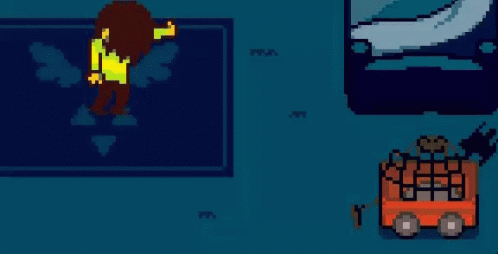
And why do they have weird lines all over their body? Both Kris and Frisk's anatomy resemble that of ball-jointed dolls. They appear just as markings across their bodies. Think of them as elaborate birthmarks. Kris and Frisk are still made of flesh and blood, but are in fact hypermobile. The reason as to why they do is still a little secret :) People here like to refer to these markings as "puppet limbs". You can get a better look at them and the scar in this artwork
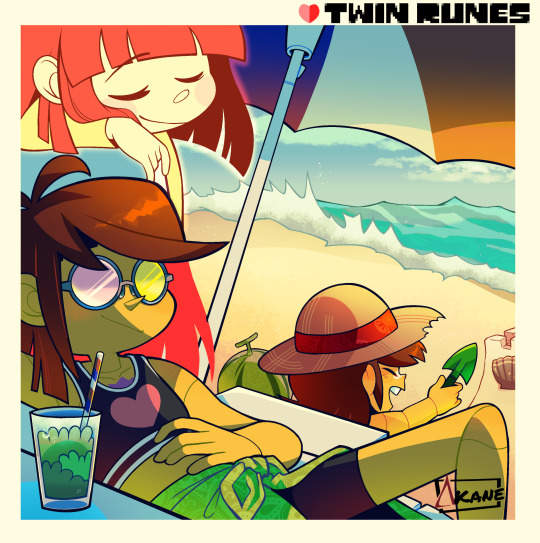
Why does Kris have braces? This is why:
Are old art, comics and asks from your blog part of Twin Runes? Unless stated otherwise, all art that was made prior to the start of the comic are not canon to Twin Runes. That mainly includes the old asks. __________________
Why is Dark World Frisk green? Frisk changes their main sweater colors with Kris when they enter the Dark World.
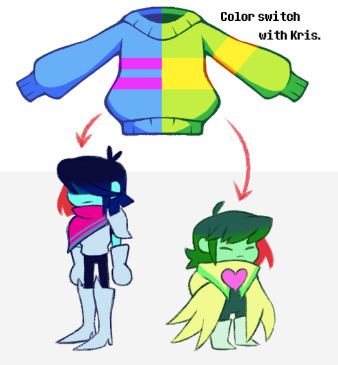
Could other ghosts see Chara? (pre Darkner transformation) No, only Frisk and Kris were able to see Chara. ____________________
IS KRIS NOW FRISK'S COUNTERPART OR CHARA'S???? :) ____________________
Where are Jevil and Spamton? Are they in Castle Town? The Fun Gang have already fought these two in the previous chapters and added them into their inventory. Outside of that little dream sequence, neither will be making an appearance. ____________________
Is anyone from Undertale Yellow gonna make an apperance? Outside of a tiny cameo from Clover (that has no greater bearing on the story) no one from Undertale Yellow is going to make an appearance. ____________________
How would the characters from Deltarune react if they met their Undertale counterpart? The universe would implode if that happens. ____________________
But what abou- The. Universe. Would. Implode. Next question! ____________________
How did you come up with the idea of Twin Runes? Twin Runes is an offshoot of a separate script I started in 2023. The concept of this script is similar to Twin Runes, but turned on its head. The funny moments in that script made me continue what now is the start of Twin Runes. I pretty much just wanted to see if I am actually capable of drawing a comic to begin with. So... in a way Twin Runes is my first attempt at a comic ever. If I ever finish Twin Runes, then I know I can tackle turning that mammoth project of a script into a comic too. In the grand scheme of things these two projects are sister series. They have A LOT in common and even share similar plot elements. When Twin Runes is over you will automatically also know certain mysteries of The Other Script. ____________________
What is The Other Script? As of this moment I call The Other Script: "Lost in the In-Between". At its core it's an inverse of Twin Runes. I.e. Kris falling into the underground and being aided by Frisk on their quest to return home. The story is considerably more grounded than Twin Runes and so are the characters. Though they do have their silly moments from time to time. The overall mood of that script is a lot darker in nature and it's a 200+ page passion project of mine. ____________________
Is there x ship in Twin Runes? The focus of this story is not on shipping. If it's in the game it will very likely be mentioned or brought up, but that's about it. ____________________
What pronouns do the human children use in this story? THEY/THEM FOR ALL OF THEM WITHOUT ANY EXCEPTIONS. That is what they are in this story. This is not open to interpretation. Please respect that. If this is a dealbreaker for you, then unfortunately this story is not for you.
___________________________________________________________
ABOUT FAN CONTENT
Am I allowed to make fanart? ABSOLUTELY! You are very welcome to make fanart if you feel like it. Please let me know if you do by tagging me, so I can share it with everyone to see so that you get the appreciation you deserve! ____________________ Can I use the funny faces you draw for memes or for stuff like memes or for profile pictures? That's what they're here for! ____________________
Am I allowed to translate the comic and post the translation to a different site? For transformative work like this, please ask me beforehand. If I have given you my permission, please link the original work with the proper credit given. ------------------------
Am I allowed to dub your comic? Just like the point above, please ask for my permission first. That is just common courtesy. -----------------------
If I have gotten your permission to create content off your comic (dubbing, translations, etc...), am I allowed to monetize it? NO. I don't make any money off this comic either, as it is purely fan content.
______________________________________________________________
ABOUT ASKS
Asks will open after a new comic has been released. I will queue the questions from Monday until Friday. Once the queue is full, asks will close. Your questions will then be answered over the course of the week.
Try not to submit multiple asks. If necessary, just keep everything in one post.
Keep in mind that I receive AL LOT of asks. There is no guarantee that every question will be answered.
Questions containing spoilers will not be answered on principle. Wouldn't be as fun if the surprise was ruined, right?
Before leaving an ask (mostly for everyone who's new), please make sure to read the FAQ section above. A lot of times your question might have been answered already.
I love memes and dumb jokes as much as the next guy, but try not to spam
It probably goes without saying, but please stay civil. I want to give everyone the respect they deserve, and naturally like to be treated the same way.
Please be mindful about drawing requests. It is understandable if you're eager to see a certain character drawn in my style, but I do not like to be bombarded by requests. The more it happens, the less likely I am to do it. Be kind and ask nicely.
I don't take unsolicited comic ideas.
Don't use other people's posts that I reblogged to ask me questions! It has happened before and I do not wish to see this!
This isn't an ask blog. The comic has a script that will not deviate. Reader interaction with the characters won't be possible due to the overall "no Player" subplot.
Please do not ask me to put your characters into the story. Like I said, the script is already finished and I'm quite happy with it. Your characters are in better hands with yourself and your own stories. Please have respect for mine.
______________________________________________________________
ABOUT SUBMISSIONS
The submission box is for FANART ONLY!
It is meant for those who do not want to submit their fanart to their own blogs, in case they feel scared or intimidated to do so.
ASKS AND REQUESTS THAT ARE SUBMITTED THIS WAY WILL NOT BE ANSWERED.
Please wait until the ask box opens. You can read more on how asks work in the section above.
______________________________________________________________
REFERENCE SHEETS
The following are ref sheets of characters that don't have established Dark World forms yet (as of writing this comic). The list will be updated as soon as a new character enters the Dark World. Here you will also find references of characters that might appear as surprise cameos, or maybe even completely new faces...

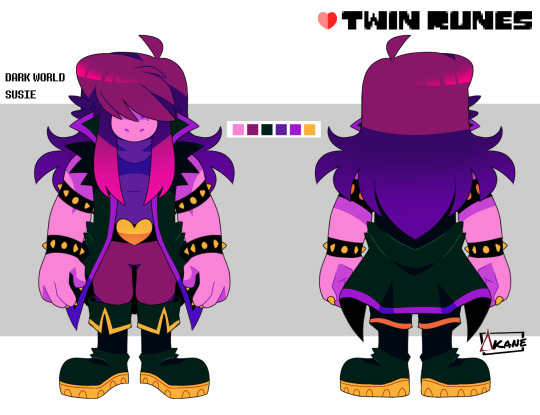
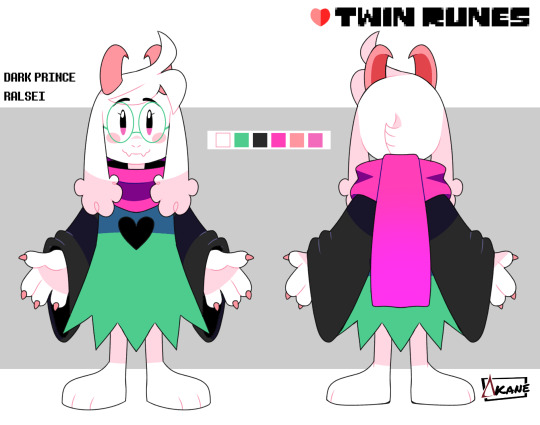

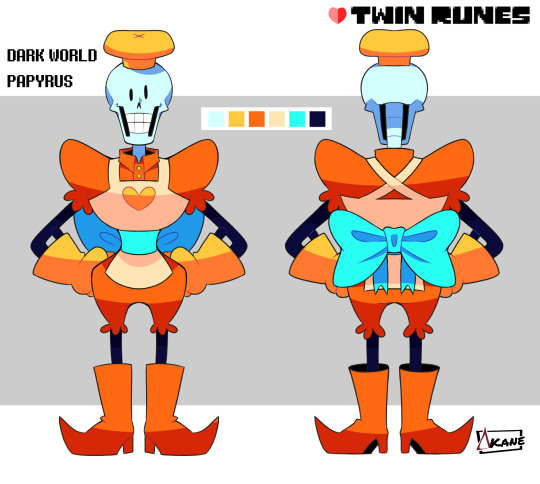

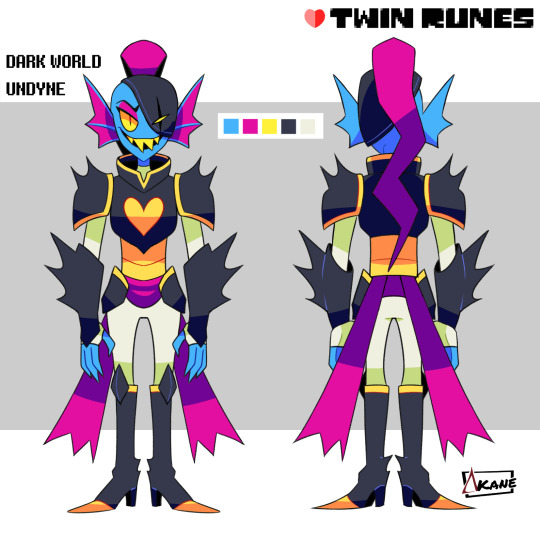
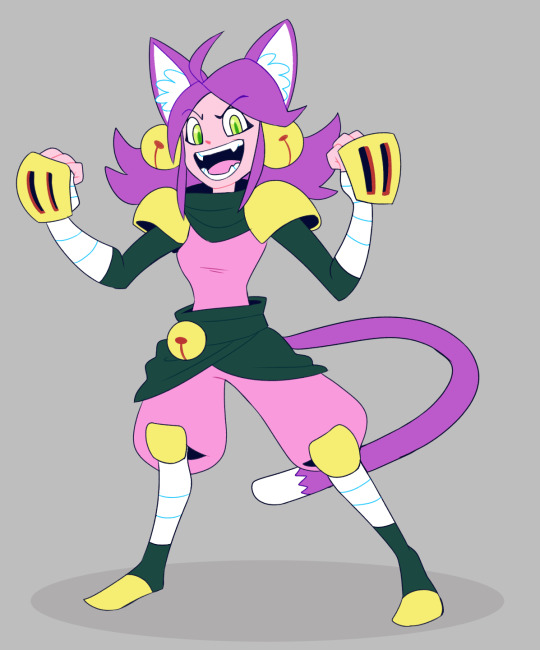
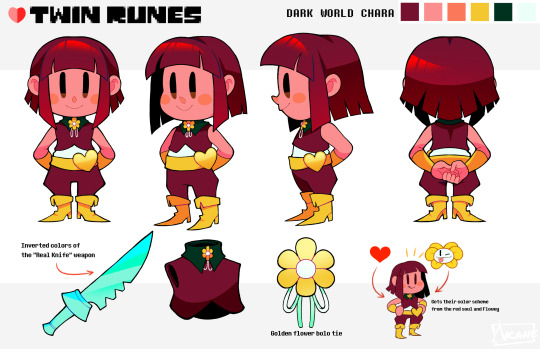







______________________________________________________________
FULL ART
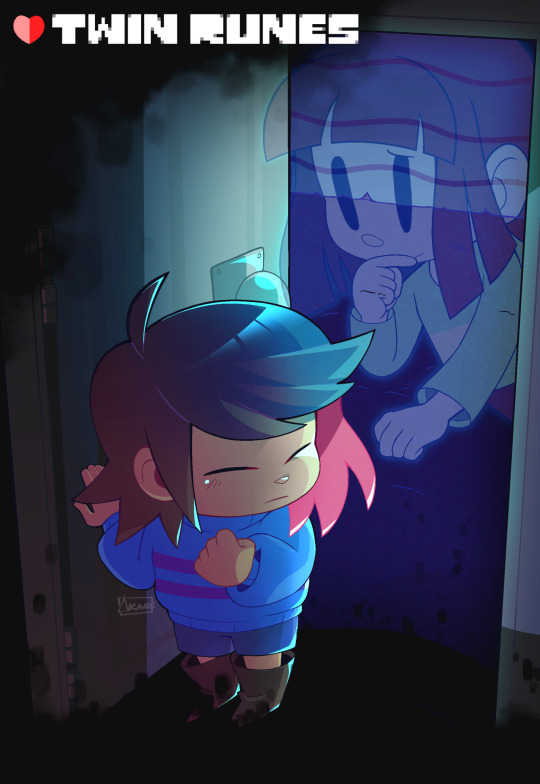

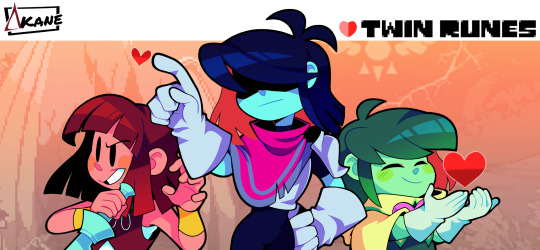

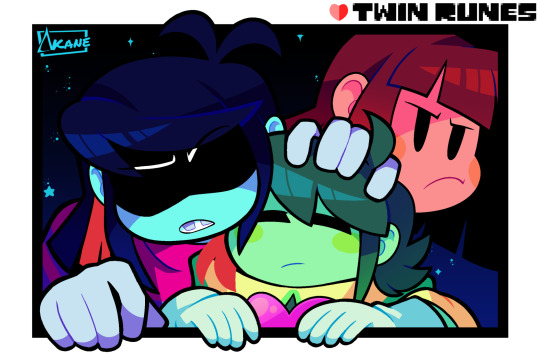

#twin runes#twin runes masterpost#masterpost#deltarune comic#comic#deltarune au#crossover#undertale#my art#FAQ#frequently asked questions#important#please read#deltarune
8K notes
·
View notes
Text
cw. worker!reader, prohero!katsuki, aged-up (25), cussing (bkg-typical), not many warnings needed for this one chat
words. 1.3k (i had to split it so that the chapter wouldn't be a whole ass novel. also for pacing purposes :0)
masterlist | part 1, part 2, part 3, part 4, part 5, part 6, part 8, part 9

Your eyes lazily trail the movement of the colleague you speak to at most twice a year as they give a presentation up front, the words they’re uttering slowly turning into a slew of blah blah blah, proper name, place name, backstory like in that TikTok you saw before falling into a fitted sleep the night prior.
Without you noticing, November has finally rolled around, and with it came one of the most important meetings involving Bakugou, Kirishima, and the agency’s department heads aimed at preparing the leaders for the year-end processes and reports.
The very meeting that you find yourself barely getting through at this exact moment.
Tanaka, the said colleague, seems like he’s explaining a pie graph about Dynamight, Red Riot, and their sidekicks’ stats, you think.
You shake your head in an attempt to bring your attention back to what’s in front of you, but your efforts appear to have been in vain as your mind, once again, drifts to the past, and you find yourself mulling over what Mina said two weeks ago.
It’s something that hasn’t left your mind since then, trailing behind you like a damned poltergeist who doesn’t know when to let up.
And as much as you’d hate to admit it, it’s caused considerable confusion on your part, and you don’t like how it may have inadvertently affected how you act around Bakugou, too.
You’re more fidgety, now, and you’ve since beaten your record of how fast you get flustered and stuttery around the man. Although if he’s noticed this humiliating, inexplicable change in your behavior, he isn’t showing it.
At least, not by much.
His gazes have been lingering for a beat too long whenever you stammered your response instead of doing so calmly like you usually do…
“Hey.”
You sit up in sudden attention, dizziness instantly hitting you from having been violently pulled from your reverie. You look at Bakugou, who’s staring you down from the end of the table, and scan the area around him, only to realize that everybody has apparently left, leaving the two of you alone in the conference room.
“Wha—”
“You weren’t listening, were you?”
You feel yourself flush in embarrassment. Guilty.
He shakes his head in what you think is disapproval, stacking the documents in front of him in a neat pile. You take that as a cue to follow suit, gathering your folders in front of you and hurriedly standing up to beeline out of the room.
The last thing you need is for these glass doors to magically lock you in, too.
But you don’t even get to reach the doorway, ass barely lifted a breadth away from your cushy office chair when he speaks up.
“I overheard you in the breakroom.”
You freeze in your tracks, lifting your eyes to meet his. “What?”
“Earlier this morning. You said—” he pauses, eyes shifting to your rear, “Sit back down, dumbass. Your knees are gonna kill you if you keep this up.”
You’re about to retort with a comeback when it dawns on you that the guy has a point, so you begrudgingly take a seat.
“As I said,” he shoots you a pointed look, “I overheard you saying you didn’t have plans for next week.”
“Next week?”
“Thanksgiving.”
“Oh, yeah,” you absentmindedly scratch your right cheek. “My family will be on vacation and all my close friends have plans with their relatives.”
One of his eyebrows raises in question, “And you won’t be tagging along?”
You shrug, “I don’t want to impose on my friends, and being with my family on a holiday isn’t exactly the most relaxing experience.”
Bakugou merely hums in response, seeming as if he’s pondering something in his head. Unable to sustain his gaze, you opt for looking around the room instead, suddenly finding the plain, gray ceiling wildly interesting.
A few moments pass before you decide that yes, this silence is going to kill you if you don’t get the fuck out now.
You lift yourself from your chair, “Well, I should get go—”
“Come over.”
As if you’re in a slapstick comedy, you, once again, freeze. “W-what?”
He clears his throat, “C-come over, to my parents’. For thanksgiving.”
You stare at each other for what feels like an eternity before his eyes gravitate toward your rear again, only this time you plop back down before he can order you to reseat yourself.
“I’m afraid I don’t follow…”
He sighs like he’s teaching you basic ass mathematics and you’re not getting it. “The old hag has been begging me to let them meet you ever since, you know…”
The news of you two “dating” broke out. Right.
You mentally slap yourself for forgetting Bakugou had parents who would eventually also catch wind of your silly little dating scandal.
At the thought of meeting the people who raised Bakugou, your throat suddenly feels a bit too dry. “I’m not sure that’s a good idea,” you manage to get out.
It’s one thing to go and pretend to be Bakugou’s girlfriend in front of the man’s fucking parents, it’s another to do so in this state that you’ve been in ever since that get-together with his friend group. You don’t exactly know why, but you’ve been fundamentally reconfigured since that fated night, and whatever the fuck is causing it, you’re sure won’t mix well with being in the same room as Bakugou’s parents. That, on top of having to act all lovey-dovey with their son around them.
You’re about to defend your case as to why they should just scrap the idea entirely when Bakugou responds.
“It’s either that or she visits us here in the agency.”
Your jaw drops, “Is that a threat?”
He draws his lips in a thin line, shaking his head. “It’s an ultimatum.”
“That’s more or less the same thing,” you counter.
“My mom likes to play with the shitty technicalities,” he retaliates, tone abrasive as ever.
You can only gawk at the guy as he shifts in his seat rather quite uncomfortably.
Is he seriously going along with his mom’s wishes now?
What happened to the ever-notorious Bakugou who just goes for what he wants without minding everyone else?
You study the man for a beat, weighing your options in your head. It’s obvious, which of the two is the wiser option. It’s a matter of going for where there are fewer pairs of eyes watching you and Bakugou’s every movement. But the real question is, why do you have to choose in the first place?
“I don’t understand,” you start, “Why can’t you just tell your mom that we’re not ready to do the whole ‘meet the parents’ thing yet?”
“Why don’t you be on the receiving end of her fucking nagging, hah?” he snaps, voice defensive and loud enough to make you jump.
“Okay, okay,” you immediately concede, tone placating, not willing for this to escalate into a fight. The last thing you need is for somebody in the building to overhear you, think you’re having a lovers’ quarrel or whatever the fuck they call it, and run to the media to gush all about it.
You’ve had enough media exposure to last you for a lifetime, thank you very much.
Chancing one last glance at your boss, you find him staring a hole into the pile of papers directly in front of him, a prominent scowl etched on his face.
His mom’s nagging must be weighing him down more than you thought.
As you study the visibly bothered man, you’re acutely aware of all the fight evaporating from your body, and you eventually find yourself slouching in your seat in what you reluctantly identify as defeat.
“…What’s your parents’ address?”
“Don’t bother,” he almost instantly replies. “I’ll pick you up.”

tagging. @kitthepurplepotato @katsukis1wife @brunnetteiwik @bunnysaursushii @beab19 @yawnzzzzzzzz @cholios @kashee-h @iluv-ace @lovra974 @chelbyisbord @k0z3me @meeeepsworld @asura-rose @dragonscribble @moonz33 @citrustsuki @deadhands69 @lemuhr @rosemarygalaxy @iluv-ace @eyesforbkg @carpe000diem @shushbruv @matchat3a @ttalgi @bakunianadecorazon @the2ndl @keiscwsz @onlyisaa @aizawa19
˖⁺‧₊ as always, reblogs, replies, and tags are appreciated <3 they make such a huge difference! have a lovely day ( ˘ ³˘)
#bakugou x reader#bakugou x y/n#bakugou katsuki x reader#bakugou imagines#mha imagines#bnha imagines#mha scenarios#bnha scenarios#bnha x reader#mha x reader#bakugou x you#bakugou imagine#bakugou drabble#bakugo x reader#bakugo x y/n
591 notes
·
View notes
Text
Pas de Deux Masterlist
Din Djarin x f!reader | 18+ | ~40k words | complete 1/15 main masterlist | ao3

summary: When Din Djarin – principal dancer at Concordia Ballet Company and generational talent in the classical style – suddenly left CBC and joined the Nevarro Ballet Theater mid-season, it shocked the ballet world. You never would have guessed that he would change your life, too.
full fic tags/warnings (spoilers!): modern AU, ballet AU, fluff, angst, flirting, dancing, lots of ballet terms (I’ll define things/link videos/etc. -- see below), misunderstandings, character study, romance, pet names (sweetheart, beautiful), lots of tension, later: smut, kissing, grinding, fingering, p-in-v sex, creampie, each chapter will have its own tags, Din lifts reader (see note below about reader)
a/n: welcome to the Din ballet fic!! I started writing this in April and it’s finally finished! I’ll post a new chapter every Wednesday, there are 14 total. There’s some smut coming but it’ll be a while, folks. See my notes below about reader in this fic and ballet in general. Thank you @katareyoudrilling for being the best beta, as always!! This fic is so much better because of you. 🧡 And thank you to @almostfoxglove for reading over it and confirming I didn't forget all my ballet, lol. 🩰
note about reader: in this fic you’re a ballet dancer, first soloist at Nevarro Ballet Theater company. I haven’t mentioned the reader’s body size or shape (or hair) basically at all, even to the point of avoiding clothing (except for costumes), but I understand the image that goes along with ballet – I danced for almost 20 years. Din does lift you many times. Please feel free to picture whatever you want, but I know that this might seem more limited. You also have a best friend named Adrian who is in the company with you. I never specified age, but to make first soloist most would be in at least their early 20s. Din is 27.
Chapter list and notes about ballet under the cut! Comment or reblog to join the tag list. 🥰🩰
Chapter List
Chapter 1
Chapter 2
Chapter 3
Chapter 4
Chapter 5
Chapter 6
Chapter 7
Chapter 8
Chapter 9
Chapter 10
Chapter 11
Chapter 12
** Bonus: Amazing art of Din by @kenobiwanx!! **
Chapter 13
Chapter 14
Epilogue
...
some notes about ballet: I will share links to videos and such as much as possible, but here are some definitions to get us started – principal, (first) soloist, corps de ballet, variation, and class vs. rehearsal:
Principal - this is the highest level a dancer (of any gender) can reach in a company. Dancers are ‘promoted’ through the ranks. Principals usually have exceptional technique and artistry and can perform solos, pas de deux (partnering), headlining and/or the most challenging roles, etc. (e.g., the white (Odette) and black (Odile) swans in Swan Lake, both usually performed by one principal). Sometimes dancers are hired directly in as principals (like Din, in this fic). Smaller companies might have 5-6 principals, while larger ones could have as many as 20. Nevarro is somewhere between medium and large and has around 14 principals, including Din.
First Soloist - not every company has this rank, but it’s in between principal and soloist. Nevarro has 4 but they are counted among the soloists (12-14ish total). Soloists are often understudies for larger parts, and first soloists would do the same. In this fic reader is a first soloist, just promoted at the start of the season.
Soloist - this is sort of a middle level, for dancers who are doing very well and have proven themselves capable of taking on bigger roles. Many ballets have multiple roles, including supporting roles in the narrative, for soloists and principals to showcase many dancers’ talents. A smaller company might have 5-6 soloists, and a larger company might have as many as 20. (Larger companies also do more shows.) Nevarro is somewhere between medium and large and has around 12-14 soloists, including first soloists.
Corps de ballet - this is the lowest/starting level in a company. It’s where most would start from and has the largest number of dancers – these are the dancers who come out on stage in large groups or form the background unnamed roles in narrative scenes (like a party). Reader started in the corps and was promoted to soloist and then first soloist.
Variation - a solo dance, usually a piece from a larger ballet (e.g., the Sugar Plum Fairy in the Nutcracker). We say ‘variation’ because there are many ballets that have been choreographed differently by multiple people in the ballet world (e.g., there are famous versions of the Nutcracker by Petipa, Gorsky, Balanchine, Nureyev, Baryshnikov… and more). So there can be multiple variations of a solo from a single ballet, and more can be created or altered, etc. But in general the term just means solo.
Class vs. rehearsal - most companies distinguish between ‘class’ and ‘rehearsal’. Class is for the whole company and focused on improving technique. It’s quick and often repetitive and everyone sort of knows what to do. Most people would have ‘their’ spot at the barre and fall into a typical order for going across the floor. After class, most would go into multiple hours of rehearsal, PT, strength training, etc., depending on whether it was a performance day or not. Most companies are rehearsing for more than one performance at a time, so they might have a longer rehearsal for the show coming up this or next weekend, and a shorter one for another performance a bit farther away. But in the days leading up to a show, that show’s rehearsals would probably take over. This can vary by company. On show days, most would have fewer rehearsals with a 1-2 hour break before the call time to get ready.
Season - companies have 'seasons' which just refers to their plan for shows/schedule for the upcoming year. They might refer to like a fall season and a spring season, or the might have a full year schedule with different parts (fall/winter/spring), or they might have only a spring season that runs into early summer. It depends on the company and the size! In this fic Nevarro has a fall season and a spring season, but they tend to think about it as a full year for contracts/etc. They would have 3-4 big shows planned (think Nutcracker, Swan Lake, Giselle, Onegin, etc.) in each part of the season (so, 3-4 in fall and 3-4 in spring). And then they'd fill in the gaps in the schedule with "mixed programs", which are programs with multiple smaller ballets or pieces that feature a lot of dancers. So a mixed program might have a 20 minute Balanchine ballet, a pas de deux, a full corps piece from a larger ballet, and a piece for like 8 dancers. or something. Mixed programs are often when choreographers-in-residence and on staff get to debut their own work.
#din djarin x reader#din djarin x you#din djarin x f!reader#din djarin fanfiction#din djarin#pedro pascal character fanfiction#the mandalorian#nbt fic#pas de deux fic#here we go folks#x reader
329 notes
·
View notes
Text
I would like to thank Delightfully
EAGER BINGE READER

@furislupus for READING and LIKING
CORAM’S HOPE, Parts 4 to 8 of 8
A World of Sea tale
CAPTURED BY THE CLANS, Part 1 of 3
Science Fiction
#@furislupus#CORAM’S HOPE#Parts 4 to 8 of 8#World of Sea#CAPTURED BY THE CLANS#Part 1 of 3#Science Fiction#Written by De Writer
4 notes
·
View notes
Text
Consejos para bajar se peso:
1. Has ayuno intermitente, es realmente efectivo
2. No superes las 800 calorías diarias
3. Todo lo que tenga 0 calorías puedes consumirlo durante el ayuno, así que puedes probar tes, café, jugos light, lo que tu quieras
4. Comprar ropa que te quede pequeña para verte obligado a bajar de peso, ya que si no lo haces, no vas a caber
5. Pasar frío. Es un mito que el calor ayuda a bajar de peso, solo te deshidrataras, pero el frío si ayuda a bajar de peso. Cuando uno pasa frío el cuerpo se ve obligado a quemar grasa para producir calor corporal
6. Si vas a vomitar, preorisa alimentos líquidos, son más fáciles de vomitar
7. Date premios no relacionados con la comida. Por ejemplo: comprárte ese pantalón que siempre quisiste pero que nunca pudiste comprar por que no lo ibas a poder usar, ir a ese lugar que te daba vergüenza por tu peso, etc.
8. Consigue a alguien que tenga el mismo objetivo y ayunen, hagan ejercicio, etc, juntos. Es mucho más divertido y efectivo.
9. Evita lácteos y asucares, es lo que MAS te hará engordar
10. Intenta que tus comidas no tengan variedad de alimentos. Vieron que cuando se llenan al comer, por algún motivo todavía pueden comer el postre? Eso es porque el cerebro manda señales que te hacen comer más en presencia de variedad. Si buscas comer menos, evita esa variedad.
11. Toma mucha agua, entre 2 y 3 litros por día
12. Has al menos 6 mil pasos diarios (parecen mucho pero no lo son)
13. Eviten comer cosas del paquete, no se van a poder controlar
14. Priorizen las proteínas para no quedar skinny fat
15. Hagan actividades que no los hagan pensar en la comida
16. El agua tibia con limón ayuda mucho al metabolismo
17. Evita las yemas de los huevos, un huevo entero tiene 75 calorías, pero la clara sólo 17, osea que la mayor parte de las calorías son por culpa de la yema
18. Usa platos y cubiertos pequeños si tienes alguno, harán creer a tu cerebro que la porción es más grande de lo que realmente es y te sentirás más saciado.
19. Has pilates. El pilates es lo mejor que le paso a este mundo
20. Haste estas preguntas a ti mismo antes de comer cualquier cosa
¿Me voy a sentir bien con mi cuerpo después de comer esto?
¿Realmente tengo hambre o solo estoy aburrido?
¿Me voy a arrepentir de comer esto?
21. Pasar frío puede quemar de 60 a 100 calorías cada 25 minutos
22. Selecciona UN día, solo UN día para quitarte las ganas de todo aquello que se te haya antojado durante la semana. Que sea siempre el mismo. El motivo es que si tienes un día en lo que puedes comer lo que quieras se disminuye la probabilidad de un atracón.
Si te dices "no voy a comer esta galleta hasta que sea delgada" van a pasar las semanas y vas a ver que todavía no eres delgada, lo que significa que todavía no puedes comer la galleta y te vas a empezar a desesperar. Lo siguiente que pasará es que vas a dejar la dieta, porque ya no aguantas las ganas.
En cambio si tienes un día designado para comer lo que quieras, te dirás "no comeré esta galleta hasta el sábado (o el día que quieras)" y al pasar los días veras que el día para comer SI se acerca y sabes cuando es, lo que te ayudará a resistir.
Obviamente, cuando llegue el día, no te comas todo lo que se pase por delante tuyo, come únicamente esos alimento de los que estuviste más antojado en la semana.
#no quiero comer#no quiero ser gorda#quiero ser flaca#ana y mia#tw ana bløg#estoy gorda#princesa ana#tc4#4nor3xia#princesas ana y mia
631 notes
·
View notes
Text









Nasty little guy PNGs, part 4 (dog edition)
(1. Ugly bulldog clay sculpture, 2. Dog painting from "Cosmographie universelle" (1555), 3. Folk art animal jug, 4. Antique Einco mohair dog (?), 5. Vintage face clay sculpture, 6. Resting bulldog concrete sculpture by Lou Rankin, 7. Prattware jug with bear holding a dog (c. 1800), 8. Vintage paper maché dog sculpture, 9. Dog painting from "A Child in Ecclesiastical Dress" by Juan Bautista Martinez de Mazo)
#png#pngs#transparent#transparents#moodboard#artboard#imageboard#collage#collages#sticker#stickers#trinkets#nasty little guys
639 notes
·
View notes